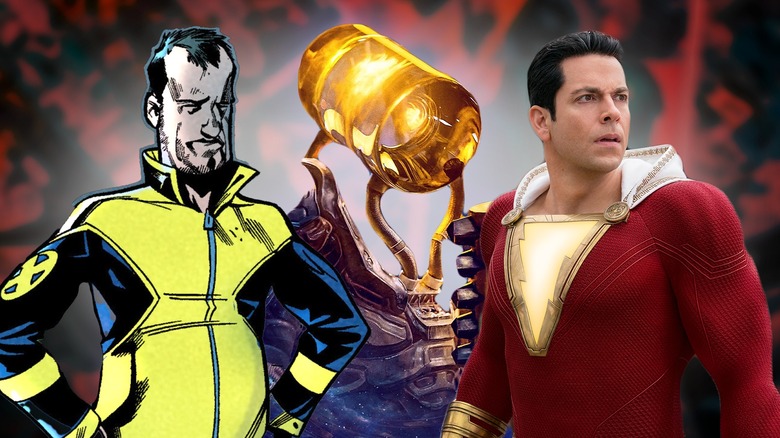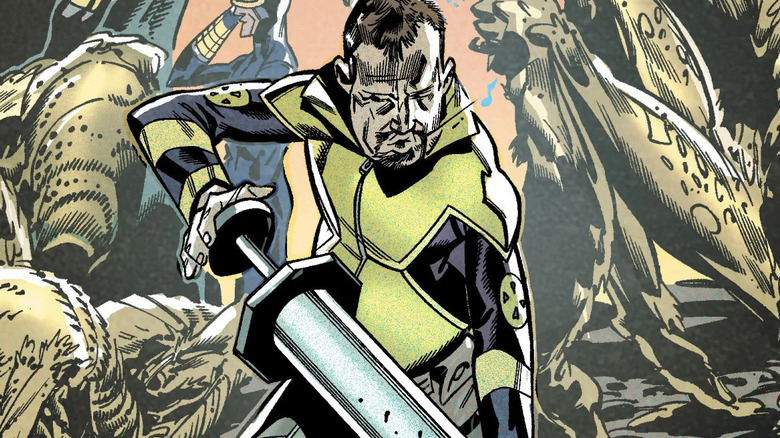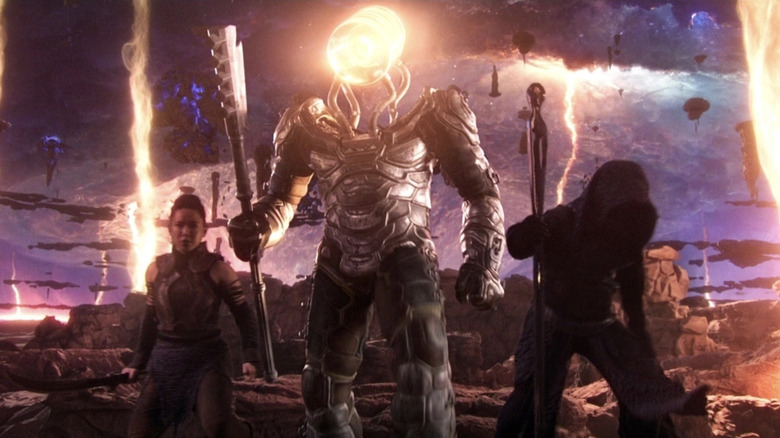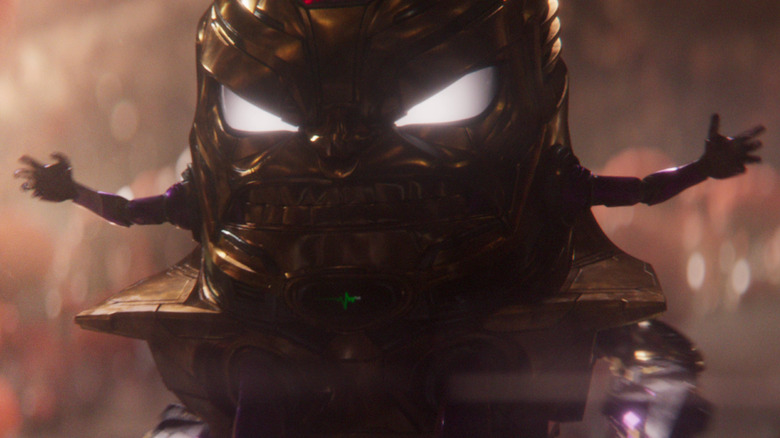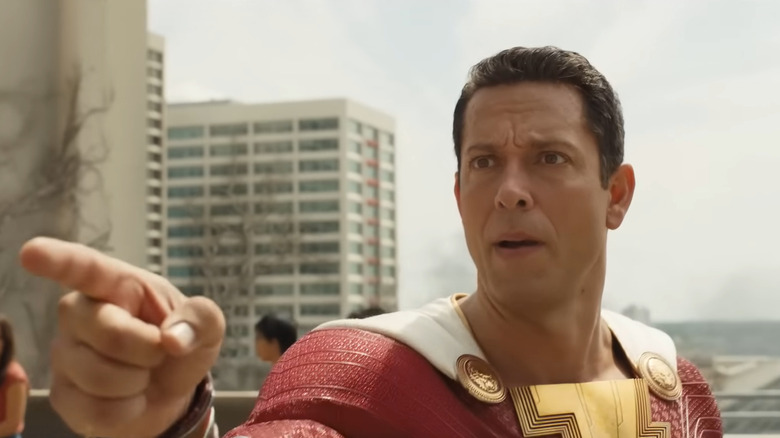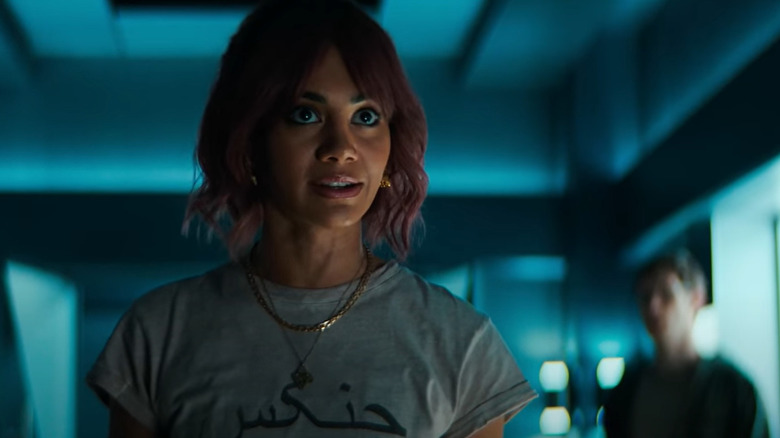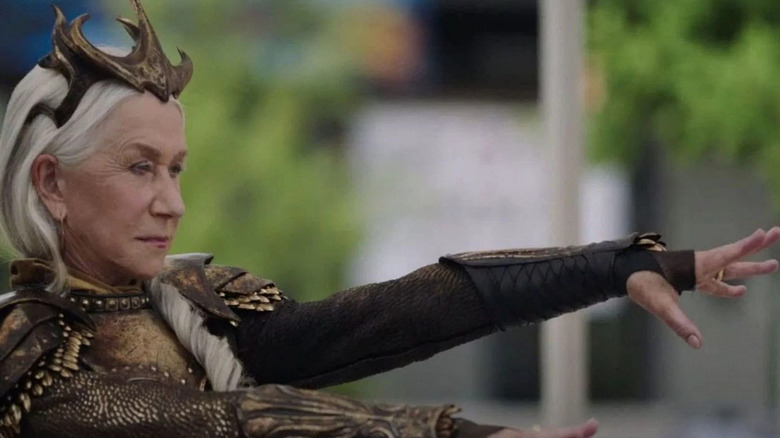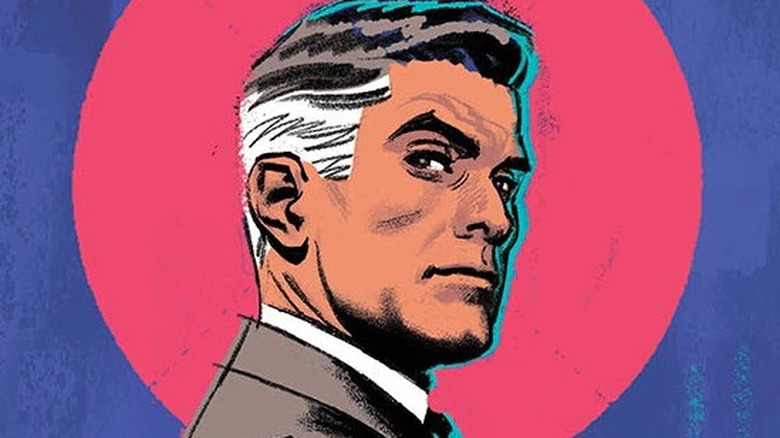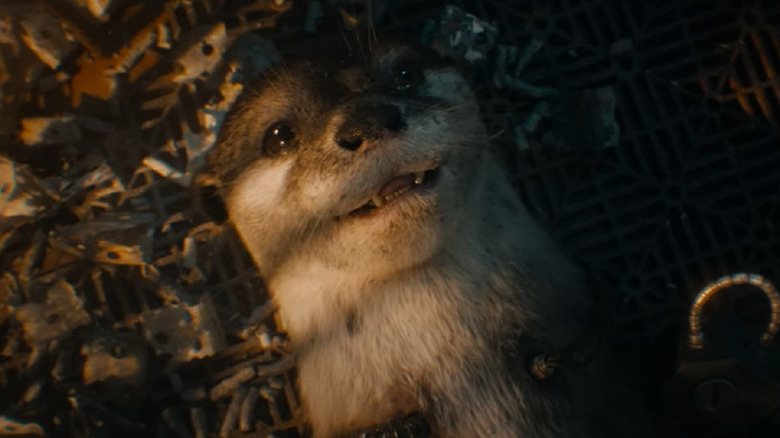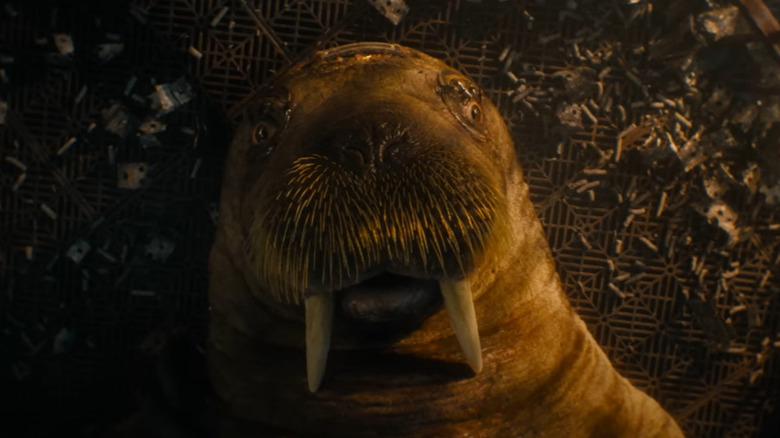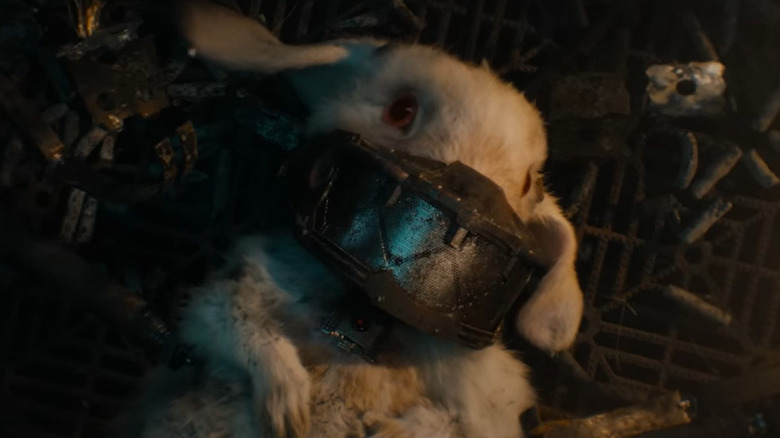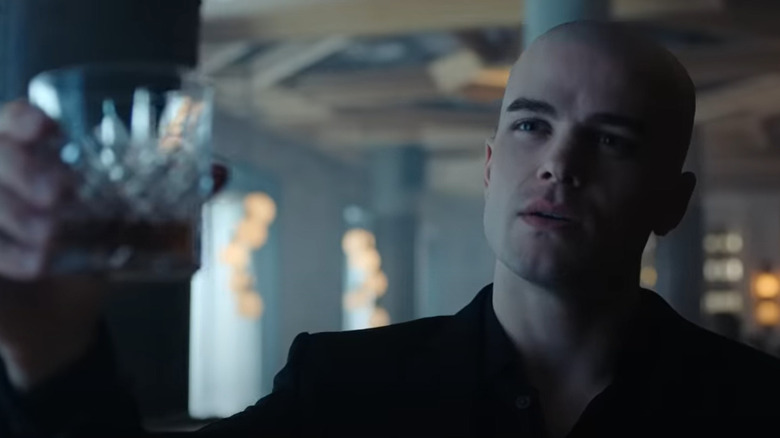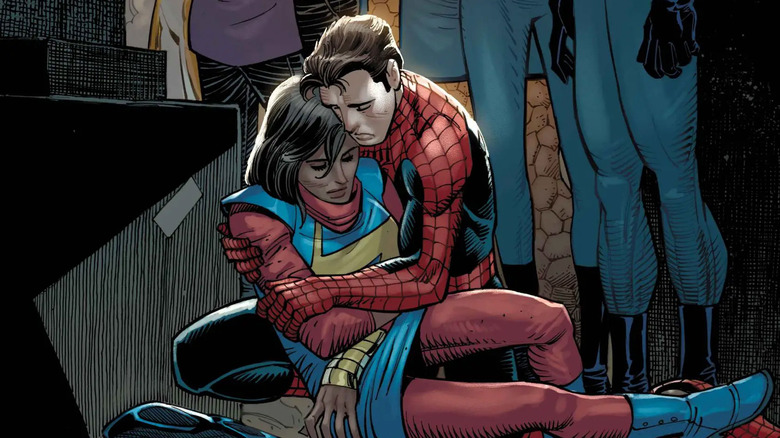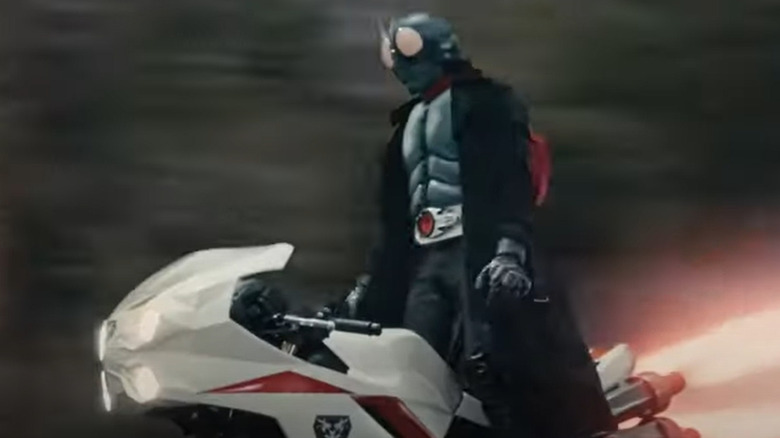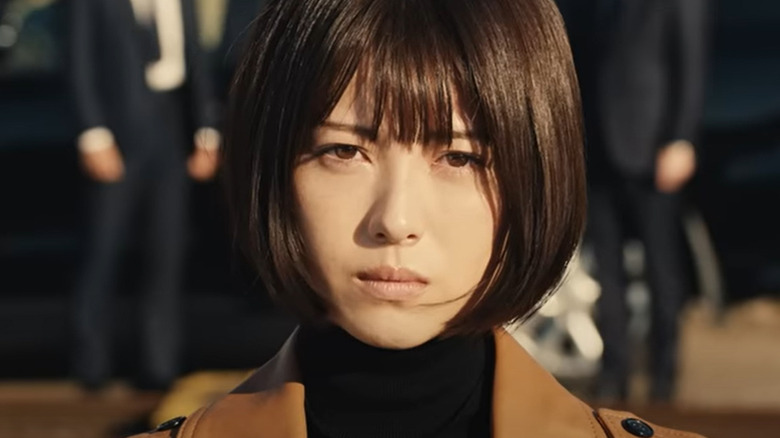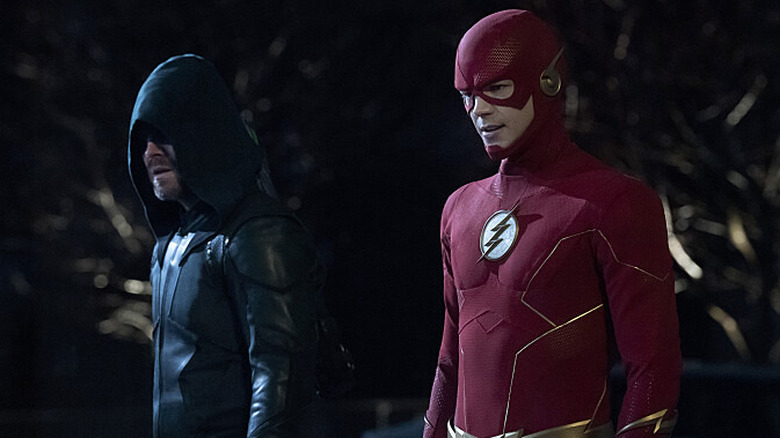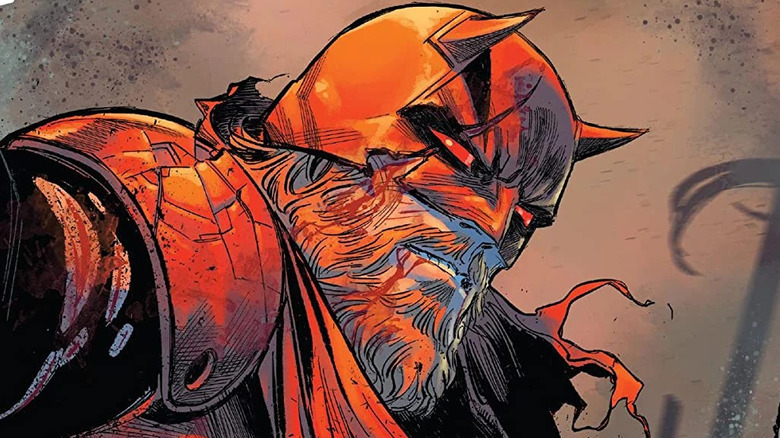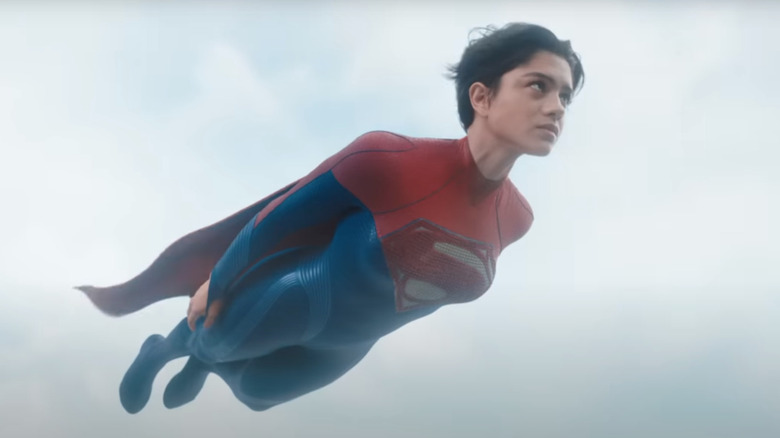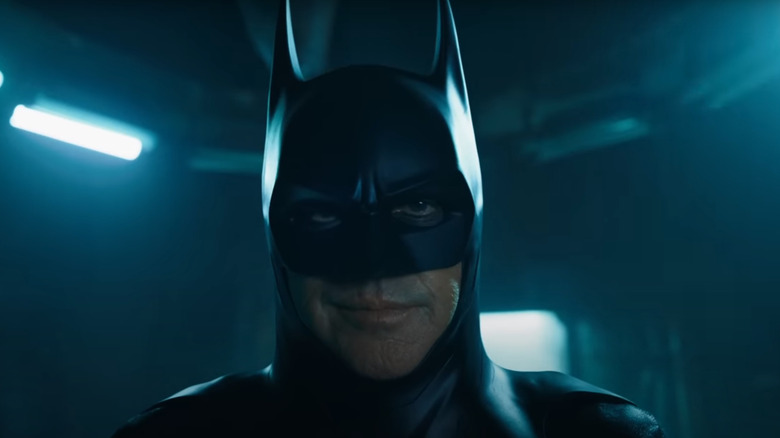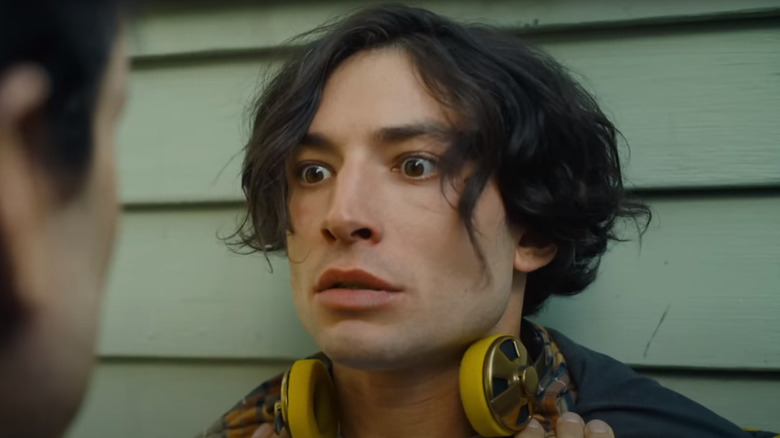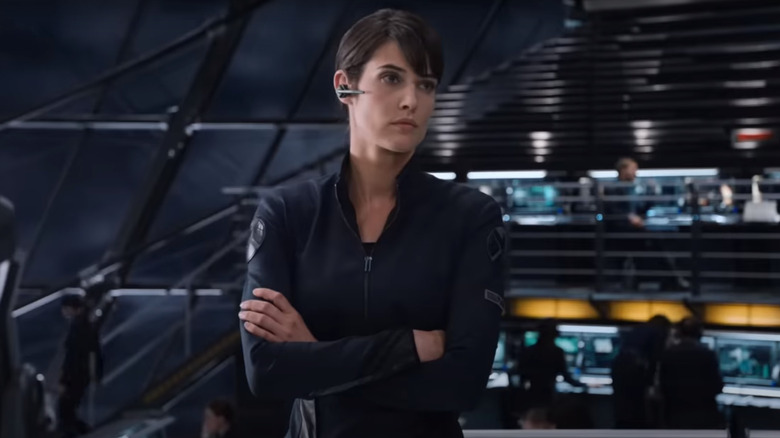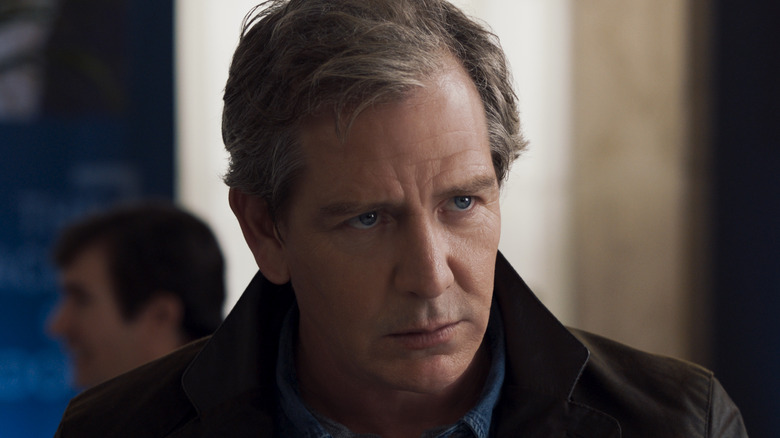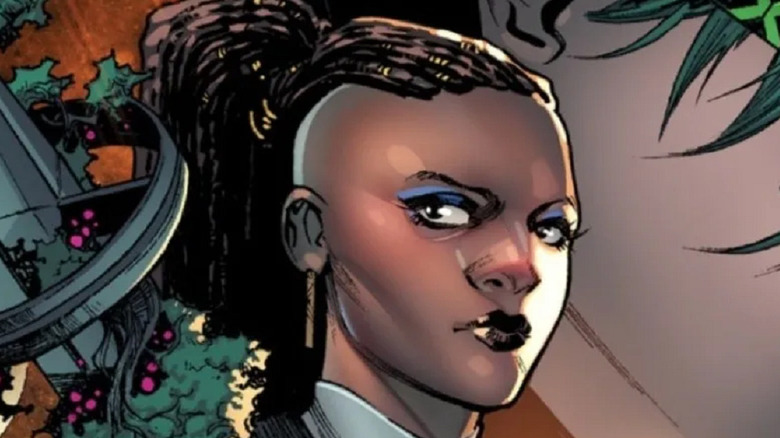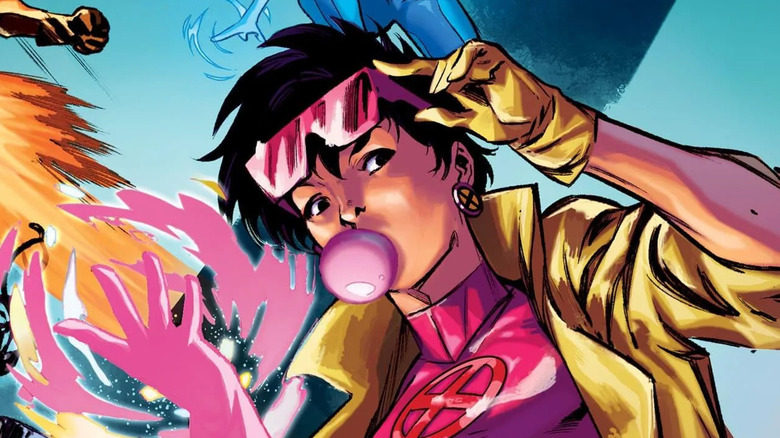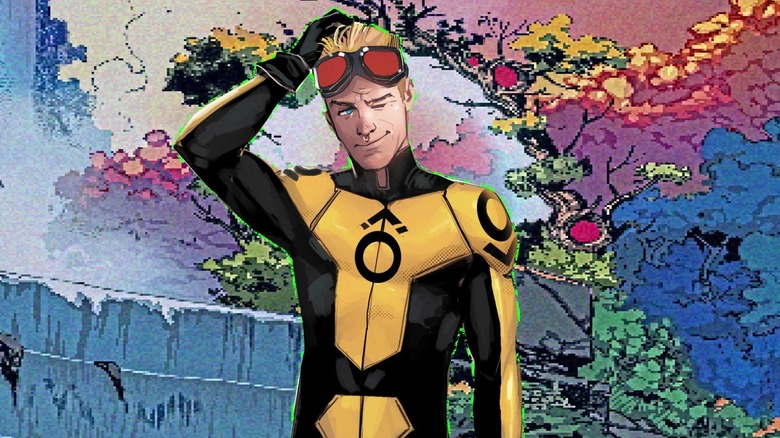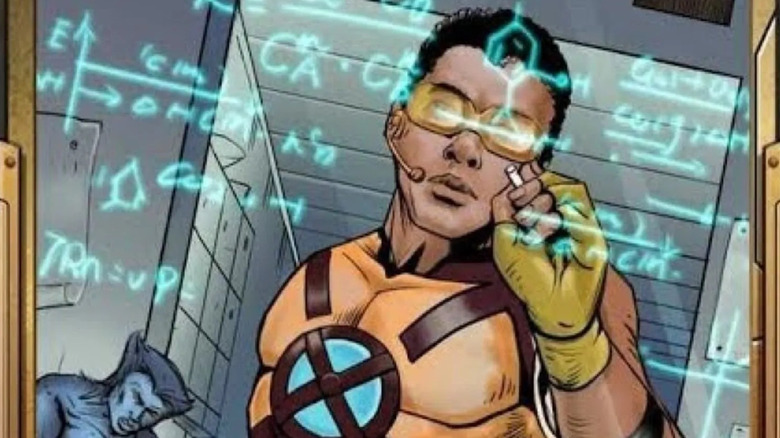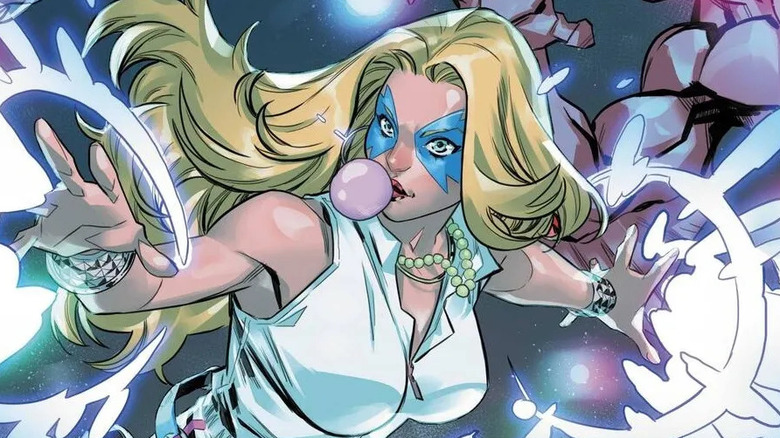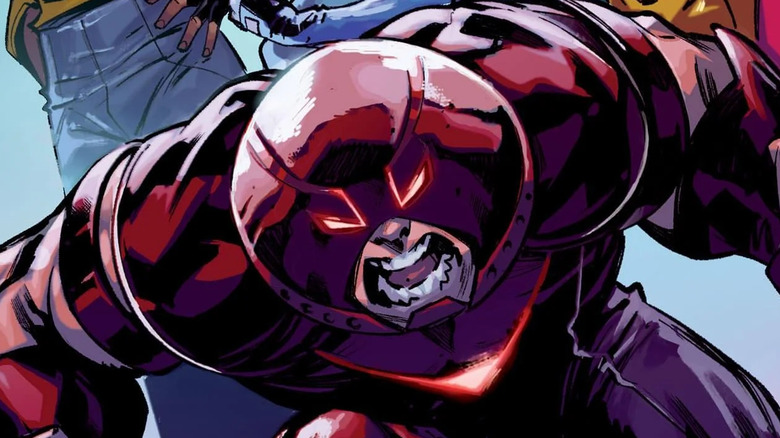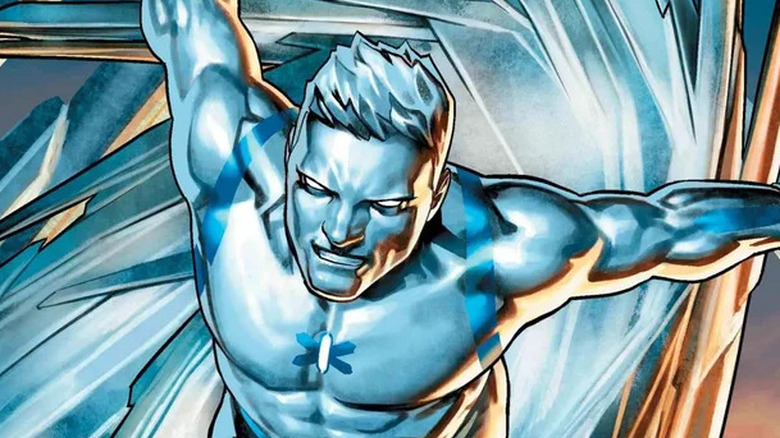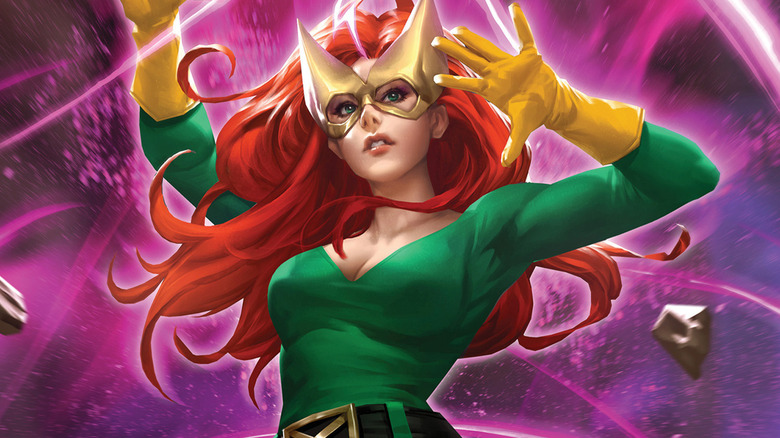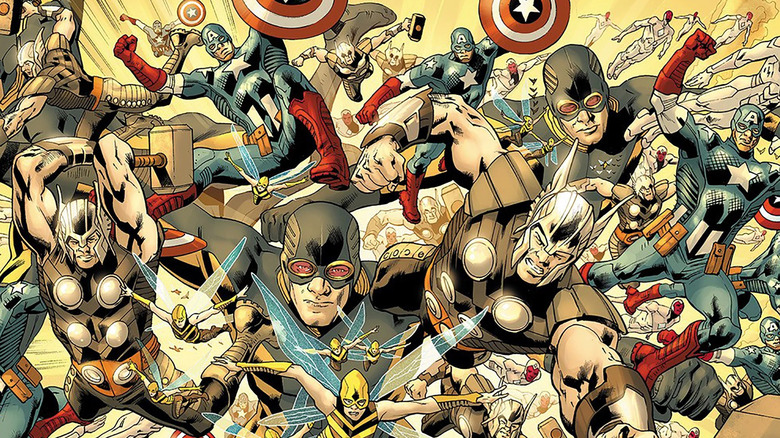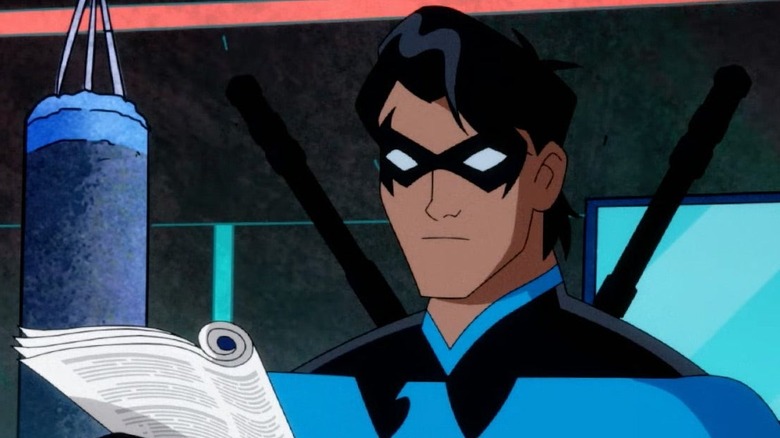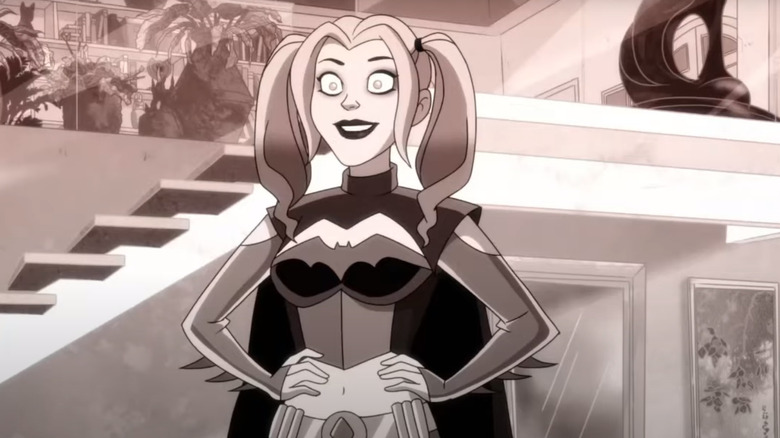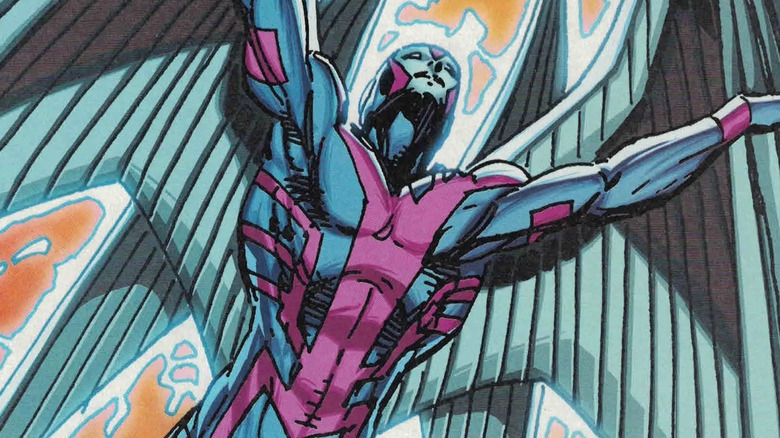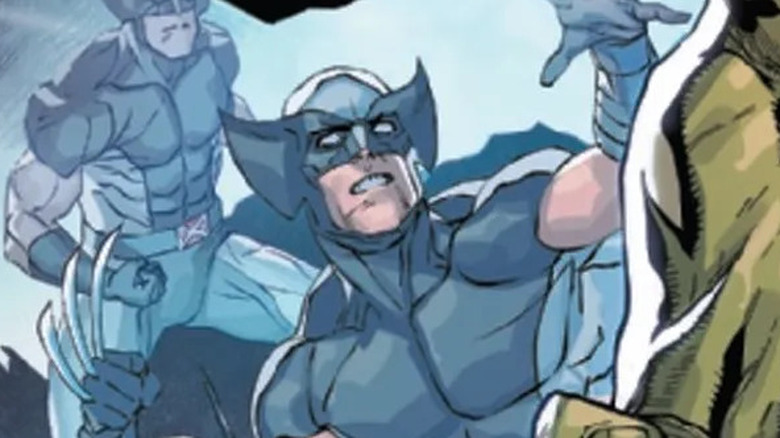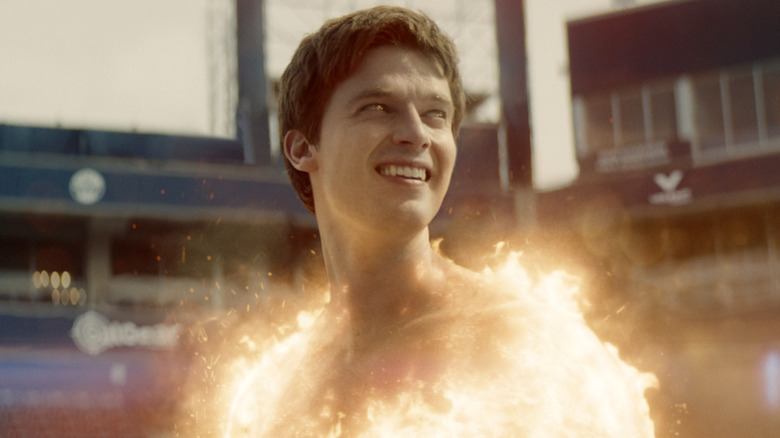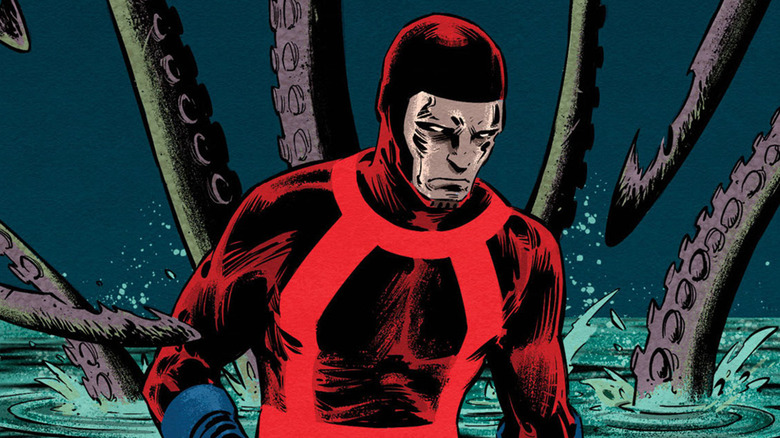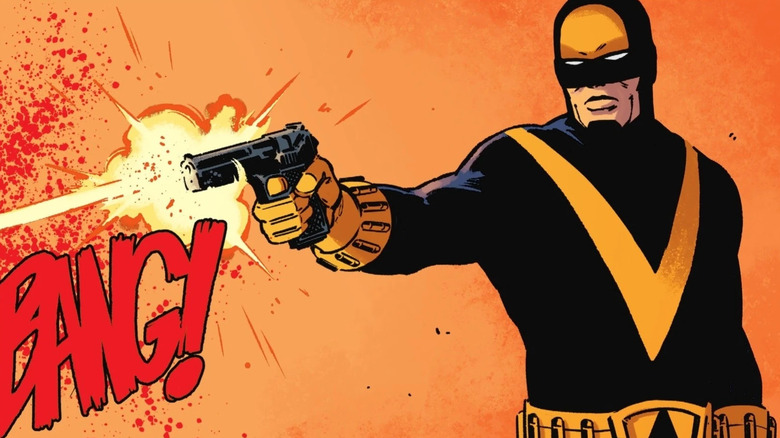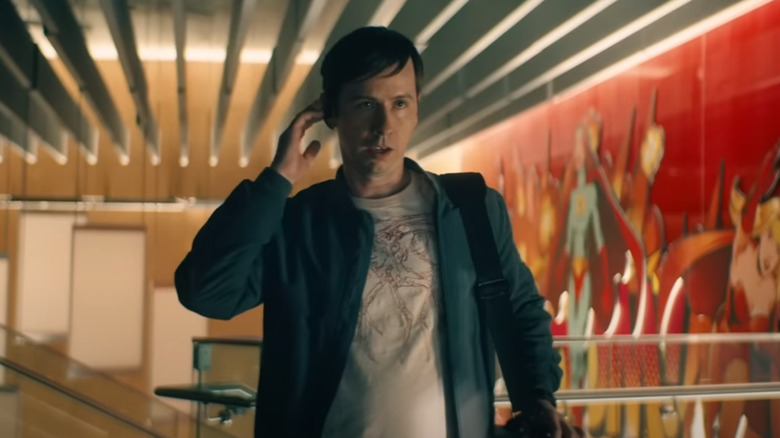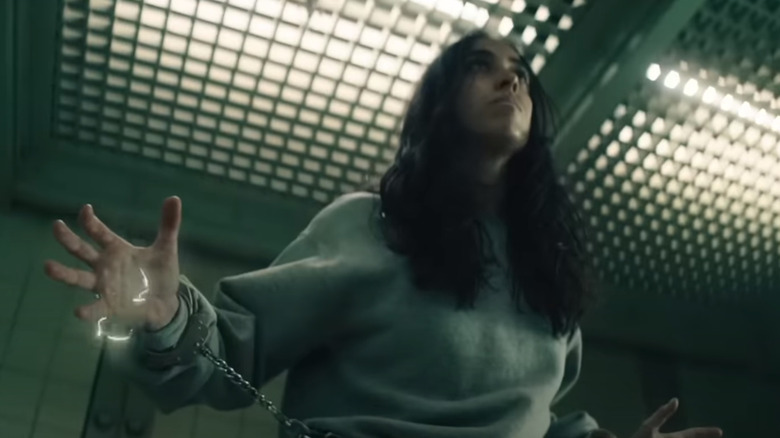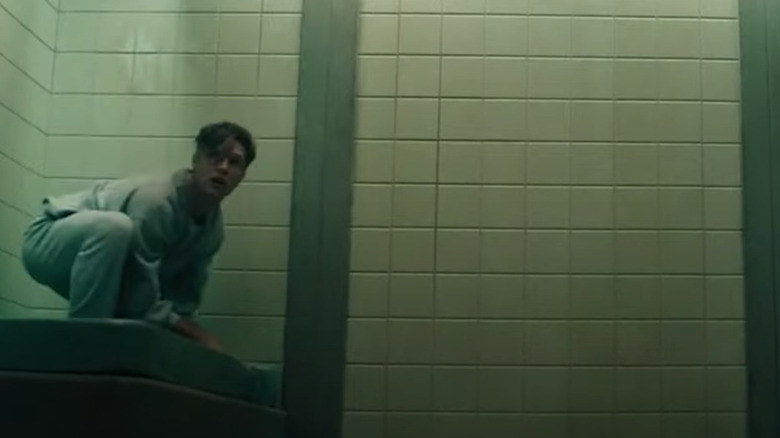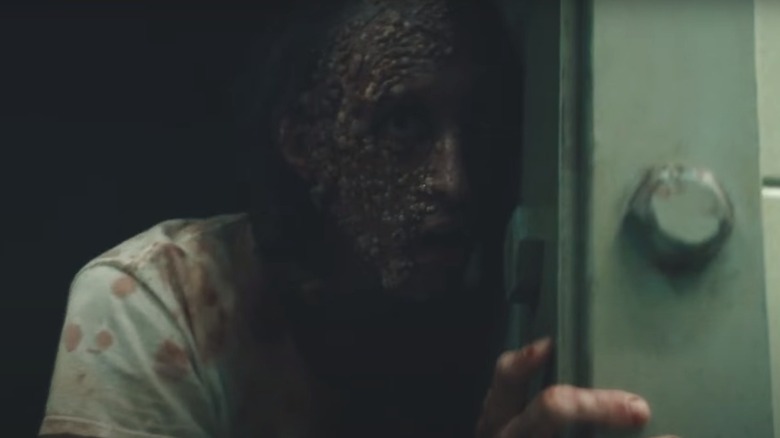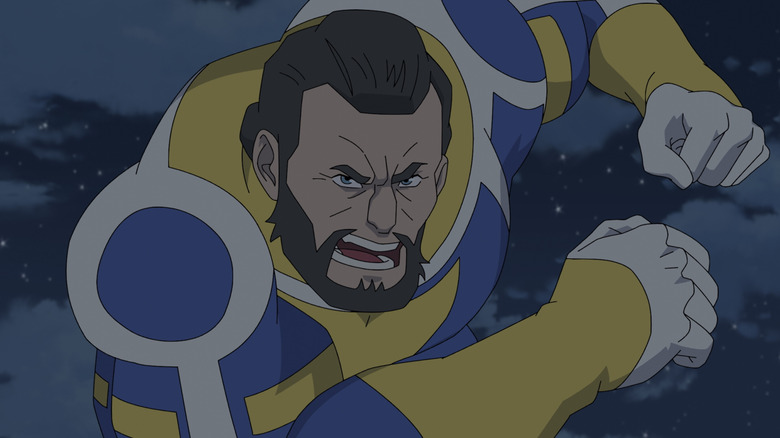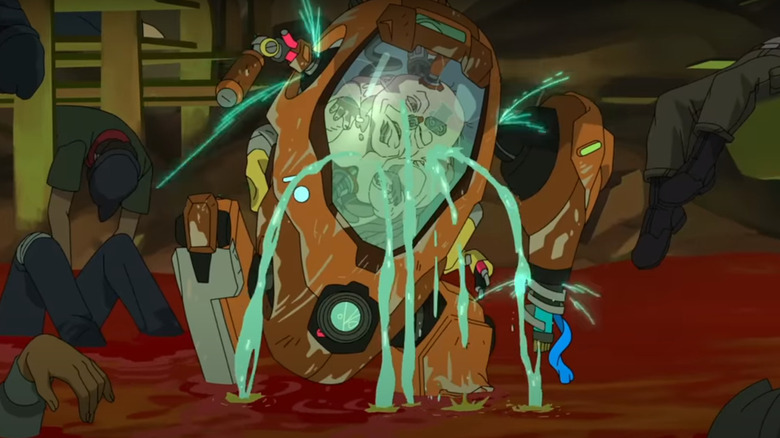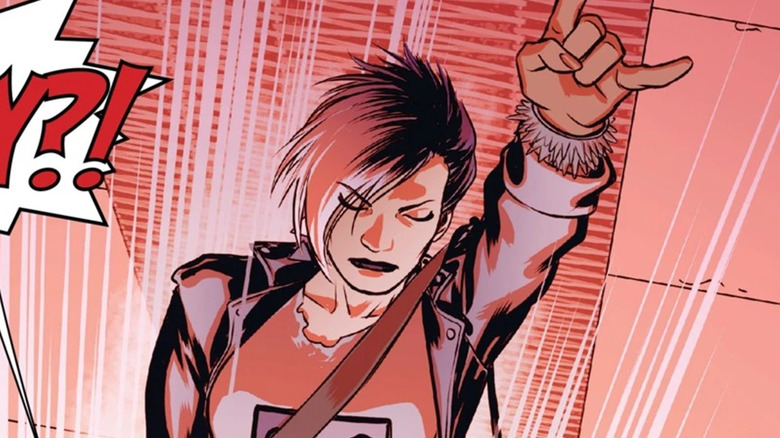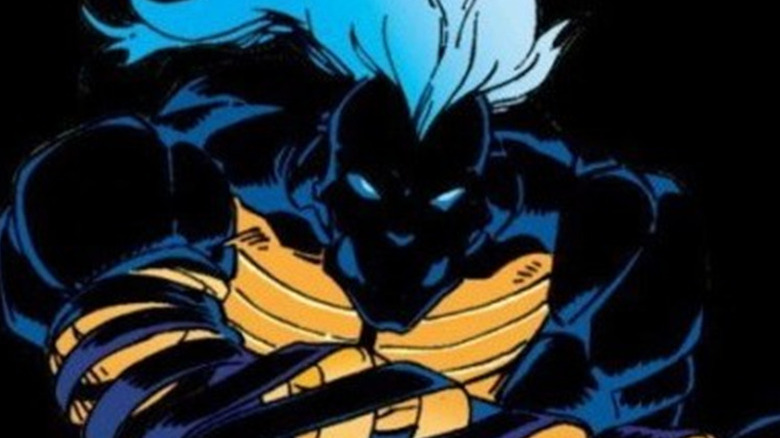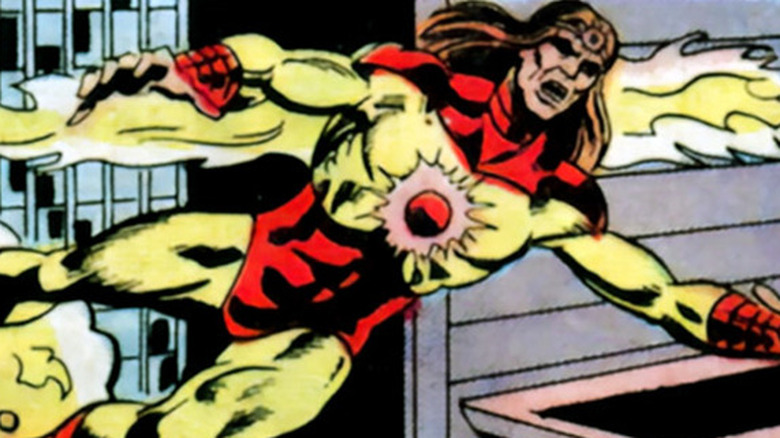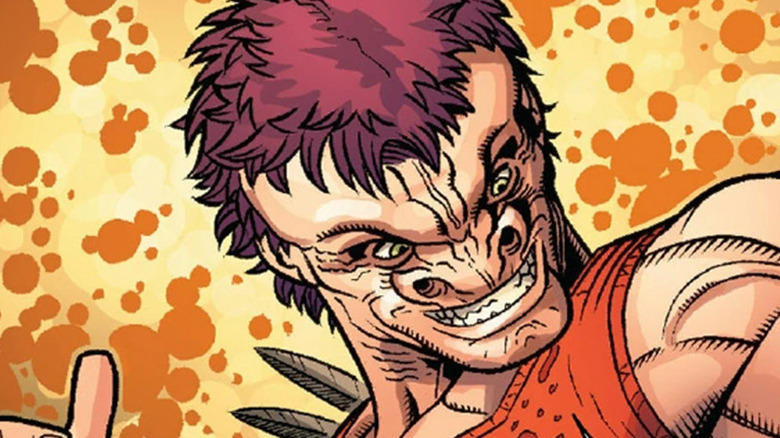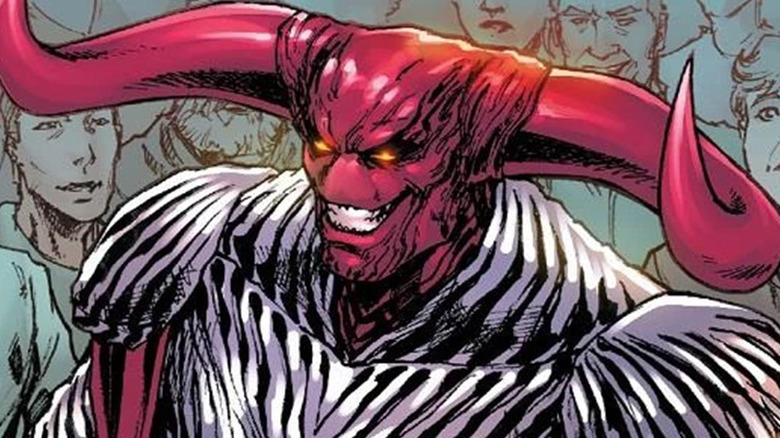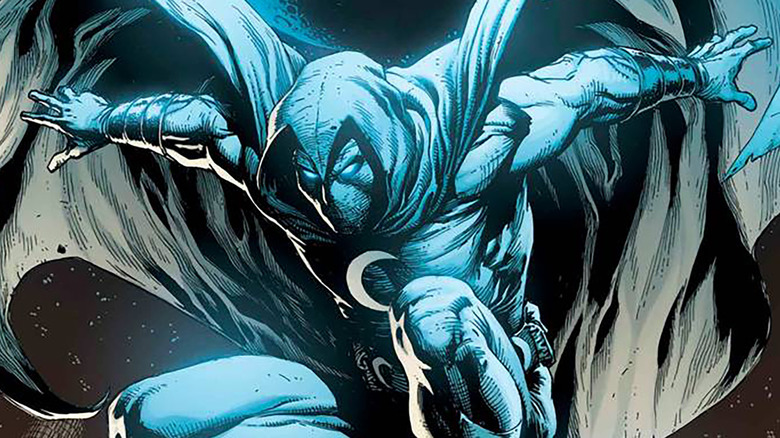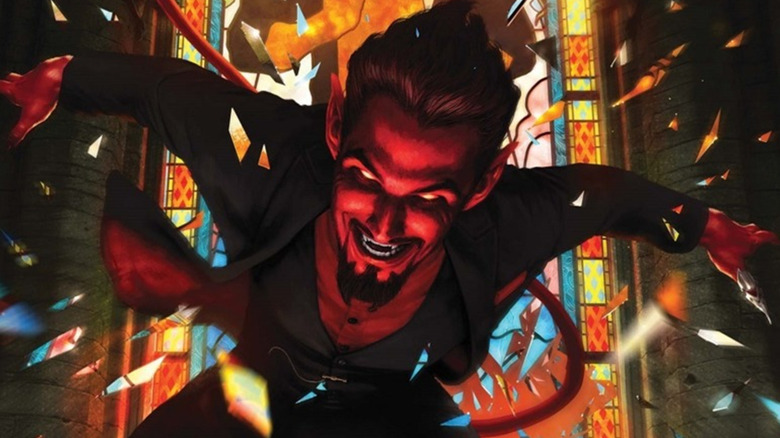Superheroes We Lost In 2023
There are only four certainties in life — death, taxes, superhero death, and the retconning of superhero death in future stories. The following victims of tragic, usually violent circumstances may all very well follow the trajectory of Superman after his murder at the hands of Doomsday in 1993's "The Death of Superman," as well as Jean Grey when she nobly sacrificed herself at the conclusion of 1980's "Dark Phoenix Saga." Jean's not even the only X-Man with a touch-and-go approach to the great beyond anymore. Most of her teammates have died and returned to life several times over ever since they moved to Krakoa and became functionally immortal in 2019's "House of X" and "Powers of X."
And what about superheroes who die in alternate realities while their counterparts in adjacent dimensions remain among the living? What about heroes who die in one medium but remain upright and breathing in another? It's all profoundly confusing, but if we didn't enjoy being confused then we wouldn't be fans of superhero media, would we? Let's gaze upon the superheroes we lost in 2023, mourn their passing, and anxiously await their inevitable return to glory.
Updated on December 28, 2023: From cinematic supes to comic book characters, here are the superheroes who met their fates in 2023.
ForgetMeNot
In the world of the X-Men, Charles Xavier devised a compilated process to literally resurrect any member of homo superior who no longer resides among the living. Said process involves Cerebro automatically backing up the memories of every mutant on the planet, as well as Hope Summers, Tempus, Proteus, Elixir, and Egg all combining their powers. Wolverine fell out of a spaceship next to the Sun and was instantly incinerated? No problem. Hope and her crew, known as The Five, will make sure he's back and even better at what he does by the next morning.
However, in order to bring a mutant back, Professor X and The Five have to remember that mutant existed, which creates a special problem for the member of Nightcrawler and David Haller's team of Legionnaires known (or should we say "unknown?") as ForgetMeNot, whose power is an inability to register in the memory of other beings. During "Legion of X" #10, in what what word-count restrictions force us to describe as a very elaborate Sentinel attack on Krakoa — in which Cain Marko temporarily merges with the Spirit of Variance and essentially battles killer robots as a Ghost Rider-Juggernaut hybrid — the remarkably unremarkable mutant sometimes called Xabi volunteers to be blown to bits in order to protect the island.
The techno-organic being known as Warlock also perishes in the scuffle, but the surviving Legionnaires immediately begin laying plans to reassemble him. As far as Xabi is concerned, it's impossible to bring back a dead person if you don't remember they ever existed.
Xolum
In case anyone who watched "Ant-Man and the Wasp: Quantumania" needs a reminder, whimsical sci-fi novelty characters like Veb the squishy guy and the glowing cylinder-headed Xolum are a dead giveaway that somebody from the "Rick & Morty" writing staff had a strong hand in Scott Lang's most contentious big-screen adventure. Jeff Loveness will get another MCU at-bat with "Avengers: The Kang Dynasty," which is more than we can say for poor dumb Xolum.
Despite his lack of a backstory or really much of an identity beyond a warrior-like disposition, an alliance with the Quantum Realm rebels, and his aforementioned flashlight-for-a-head thing, audiences the world over felt a slight tug on their heartstrings when Kang popped Xolum's cranium like an overcharged florescent bulb. Granted, it might have been a very slight tug in most instances, but as far as "Quantumania" characters go, Xolum definitely does more to further the plot than Lord Krylar or Hope van Dyne, and they're both played by major celebrities. Xolum didn't deserve much better, but he definitely deserved a little better.
MODOK
The MCU's infamously overworked digital designers did the best they could to turn Corey Stoll into a giant head with proportionately tiny arms and legs. Whether they pulled it off might be a matter for debate, but for reasons totally unrelated to the limits of modern special effects technology, MODOK — the Mechanized Organism Designed Only for Killing — isn't expected to appear in future MCU films.
After Cassie Lang reminds Kang's most ridiculous henchman that it's "never too late to stop being a d***," MODOK takes her advice to heart and bites the big one while helping an army of giant ants vanquish the Quantum Realm's one-time Conqueror. With his dying breath, he looks into the eyes of former arch enemy Scott Lang and says, "At least I died ... an Avenger." While MODOK probably can't legitimately declare himself an Avenger and Scott probably doesn't have the clout to approve new members even if he wants to, MODOK's last-second face turn is enough to qualify him for this list.
Shazam
In this instance, when we say Shazam "died" this year, we actually mean a couple of different things. Since basically nobody saw "Shazam! Fury of the Gods" during its theatrical run in March, star Zachary Levi invited us all to question his judgement with some truly baffling PR blunders, and the entire live-action DC Universe is in the process of a highly publicized reboot overseen by James Gunn, the prospects for this iteration of "Shazam!" carrying on as a franchise look very slim. Incidentally, the character Shazam, aka Billy Batson, also fails to survive a battle against the film's ultimate antagonist, the goddess Kalypso, one of the daughters of Atlas. But Billy's death is very temporary; Wonder Woman makes a surprise cameo and brings him back to life in a scenario that makes Krakoan mutant resurrection look plausible by comparison. Incidentally, Wonder Woman probably doesn't have a third movie coming out, either.
Jinx
By splitting its 12-episode Season 4 in half, "Titans" made sure we wouldn't know if Jinx survived getting stabbed in the gut with a magic pitchfork in Episode 6 — which aired in 2022 — until 2023. It's here in Episode 7 that we learn Jinx does, in fact, expire. Rachel "Raven" Roth sends the fragments of Jinx's soul to be at peace in the afterlife, and that's apparently that.
A recent addition to "Titans" who made her first appearance Season 4's Episode 3, appropriately titled "Jinx," the snarky magic user and "Teen Titans" adversary going back to Marv Wolfman's 1980s had a certain amount of "Red Shirt on 'Star Trek'" energy surrounding her before HBO Max announced this show wouldn't continue beyond this season anyway. Still, it's a drag Jinx won't be in the final six episodes. Or maybe it's for the best? Is being on "Titans" — a grim, live-action "adult" iteration of "Teen Titans" that never quite felt necessary — a good thing? A bad thing? Maybe it just is what it is.
Hespera
Hespera is a Greek goddess of nymphs; MODOK is a Lee 'n Kirby creation from their late-'60s phase, when they were learning just how many out-there concepts their readers would put up with. You wouldn't think Hespera and MODOK would have much in common, but in fact, they share a handful of distinctions. Both appear in poorly received 2023 superhero movies; both begin their stories in these films as baddies but switch sides and fight on behalf of order and decency before the credits roll; both perish at the conclusion of their respective, redemptive story arcs.
Despite being played by Oscar winner Helen Mirren, Hespera is done in by her sister Kalypso, an even meaner nymph goddess. Let us note that Kalypso is portrayed by Lucy Liu, whom we must respectfully note does not yet have an Oscar. Makes you wonder about the judgement of the Academy, doesn't it? After all, if Helen Mirren is powerful enough to win best actress in a leading role, then how is it that she can be pretend-killed by the Oscar-less and therefore presumably less powerful Lucy Liu?
The Human Target
Tom King and Greg Smallwood's "The Human Target" starts with Christopher Chance downing a tumbler full of poisoned whiskey intended for the gullet of one Lex Luthor. The poison takes 12 days to conclude its victim. As you read this series, it always feels like there's a possibility — a chance, if you will — that The Human Target might evade execution. But nope: After 12 issues, he dies from the poison right on schedule.
Anybody who's half-paid attention to DC Comics during the last six years knows King tends to set his 12-issue maxiseries in their own individualized Elseworlds-esque timelines. But whether or not the Human Target is considered canonically dead in the primary DC universe, this series deserves mention. The art channels the Justice League's self-satirizing 1980s incarnation through the prism of AMC's "Mad Men," which might look ridiculous were it not for Smallwood's evocative, sometimes melancholy sense of retro-cool. Meanwhile, King hasn't convinced us to care this much about a C-lister hero since he made his career with 2017's "Mister Miracle." The Human Target might perish, but he does so in unforgettable style.
Lylla
Heading into director James Gunn's final installment of his "Guardians of the Galaxy" trilogy, plenty of fans were bracing themselves for a bloodbath. Dave Bautista and Zoe Saldaña have indicated a strong interest in moving away from Marvel, and in the trailers, Rocket Racoon and Star-Lord both look like they're in pretty rough shape. For all we knew, Gunn would blast the whole zany found family to oblivion on his way out the door just to give his new bosses at DC one less beloved franchise to compete with.
As it turns out, the Guardians themselves all survive the events of "Vol. 3," but Gunn found a totally unexpected way to break our hearts. In flashbacks to Rocket Racoon's early years as a living experiment in the High Evolutionary's space laboratory-slash-baby animal jail, we meet young Rocket's adorable cellmates and pals Lylla the otter, Teefs the walrus, and Floor the rabbit. One thing leads to another, and Rocket attempts an escape with the intention to bring his buddies — framed almost like a proto-Guardians team, at least from Rocket's perspective — to freedom with him. In a move that should instantly make the High Evolutionary one of the most despised MCU villains ever, he cruelly executes the kindhearted Lylla in front of Rocket, ensuring that she'll never get a chance to experience life outside of a cage.
Teefs
Teefs the walrus also doesn't make it through the High Evolutionary's crackdown on Rocket's prison break. Like Rocket, Lylla, and Floor, Teefs anticipates a future life on a "new world" implicitly promised by the High Evolutionary, whom he refers to as "sire." Constantly jolly and joyful despite the fact that his lower half appears to have been replaced by metallic wheels for some confounding reason, Teefs name himself "Teefs" because his teeth are much larger than everyone else's.
To get an appropriate level of justice for Teefs, Rocket would have to end "Guardians of the Galaxy Vol. 3" by murdering the High Evolutionary in a manner far, far too dark and sadistic for a PG-13 threshold of violence. Sure, High Evolutionary gets some comeuppance, but boy, does he ever deserve a million times worse. Thanos killed half of all living creatures in the universe, but we think even he would've stopped short of harming Teefs. Thanos feels kind of bad about hurling his daughter off a cliff, after all — he has some capacity for empathy. That's more than we can say for the miserable, awful, ironically lowest of the low High Evolutionary.
Floor
We know James Gunn reviewed Grant Morrison and Frank Quitely's "All-Star Superman" to prep for his next major superhero project, but "Guardians of the Galaxy Vol. 3" — particularly its inclusion of Floor the rabbit — suggests a familiarity with one of the other Morrison and Quitely collaborations from the 2000s.
In "We3" — published by DC's Vertigo imprint (RIP) — a shadowy government agency converts a dog, cat, and rabbit into cyborg black-ops assassins, while the animals wish only to resume their original frolicking- and naps-oriented existences. Out of Rocket's friends from the High Evolutionary's cages, Floor appears to contain the most mechanical enhancements — she requires a sound converter around her mouth to form words and bounds around playfully on rickety, spider-like legs — and thus seems like an indirect resemblance to Pirate the rabbit from "We3." Floor, who whimsically names herself "Floor" out of a seemingly lack of better ideas, dies along with Lylla and Teefs. Like Rocket, we will probably never get over it.
Superboy
During the last episode of "Titans," Superboy spends quite a while lying motionless on a table as his lungs and heart do positively nada. In the interest of full disclosure, let's note his comrades in the Titans never seem all that distressed about his apparent passing, and when Conner asks, "Wait, was I dead?" upon his surprise-ish comeback, nobody gives a definitive answer. Maybe Superboy doesn't die enough for the Titans to qualify it, but he dies enough for us. He sure looks dead for a hot minute.
Probably the most interesting character in the final season of "Titans," Superboy leans into the Lex Luthor side of his genetic heritage throughout much of these 12 episodes. Naturally, he realizes the error of his newfound moral relativism and rejoins his chums when he starts to think he can't shut down Brother Blood, this year's big bad, on his own. This theory proves completely accurate — B.B. puts Conner's lights out, seemingly for keeps, with a hyper-charged magic bolt. Let this incident serve as a reminder to us all that Kryptonians are vulnerable to forces other than Kryptonite — particularly, magic.
Ms. Marvel
In 2022, Kamala Khan made her long overdue live-action debut in "Ms. Marvel," one of the better-received shows in the MCU's slate of Disney+ projects. Fall 2023 is looking like an even bigger deal for Kamala; once again played by Iman Vellani, she's co-starring in "The Marvels" alongside Teyonah Parris' Monica Rambeau and Brie Larson's Carol Danvers. With all this momentum and subsequent potential for marketing synergy, Marvel Comics has decided to ... kill Ms. Marvel off in an issue of "Amazing Spider-Man"? Yep. Not only does she get bumped off when she's on the cusp of her all-time height of visibility in mass media, she goes out as a supporting cast member in another hero's ongoing. And this information somehow fell into the hands of major news outlets weeks before its publication. This is all scanning as a bit strange, and we don't mean Stephen.
Anyway, Kamala Khan — who's been interning for the lately reformed Norman Osborn — dies protecting her co-worker and friend Peter Parker's ex Mary Jane Watson from a thoroughly unremarkable supervillain. Some influencers predict Kamala — already a verified mutant in the MCU, let's remember — will simply enter the Krakoan resurrection protocols and make a surprise-ish return as the star of her own new series before the end of the summer, and jolly jeez, do we ever hope they're right.
Kamen Rider No. 1
There's no doubt that "Kamen Rider" lacks the global name recognition of the other two tokusatsu franchises in Hideaki Anno's "Shin" reboot series — those being "Godzilla" and "Ultraman." And yet, "Shin Kamen Rider" is not a sequel. It's not part of a shared universe, it doesn't explicitly reference any prior iterations of the masked rider story, and familiarity with pre-existing media is not required to comprehend "Shin Kamen Rider." Let us, here, acknowledge the irony: Perhaps the most accessible superhero movie of 2023 is written and directed by the same guy who did "The End of Evangelion."
Takeshi Hongo (Sôsuke Ikematsu) — a cybertronic fusion of a motorcyclist and grasshopper, eventually designated Kamen Rider No. 1 — engages with and dispatches agents of the nefarious SHOCKER organization in towering hand-to-hand combat throughout the film. Though technically he doesn't survive the final boss fight against Butterfly Aug, aka Kamen Rider No. 0, aka Ichiro Midorikawa (Mirai Moriyama), at least he foils Butterfly Aug's plan to evacuate all human souls and send them to a nebulous hell dimension, leaving their useless meat sacks to rot and fester amongst the rest of tangibility.
Ruriko Midorikawa
In "Shin Kamen Rider" Hongo rescues his mentor figure and platonic companion Ruriko Midorikawa (Minami Hamabe) from a kidnapping attempted by Spider Aug (Nao Ōmori) — arguably the least endearing spider-themed character to appear in recent memory. Hongo starts the story missing considerable chunks of memory, leaving it up to Ruriko — whose brain, helpfully, is part super-computer — to fill him in on the nature of the empowering invisible force known as prana, as well as SHOCKER's whole deal and her own connections to SHOCKER and Hongo's creator, Dr. Hiroshi Midorikawa (Shin'ya Tsukamoto). Right around the conclusion of the second act, Ruriko meets her own conclusion via the claws of Mantis-Chameleon Aug, the only augmented cyborg hybrid in the movie who combines two animals instead of one. Happily, Mantis-Chameleon Aug's ability to sneak up on folks does him very little good in a fight against Kamen Rider No. 2, who avenges Ruriko shortly thereafter.
The Flash (TV)
Season 9 of "The Flash" marks more than the end of a single series. As the longest-running branch of DC's Arrowverse — a shared TV universe that unofficially launched on The CW with "Arrow" all the way back in 2012 — it brings an end to an important era of live action superhero adaptations. But before the four-part "Flash" finale, "A New World," begins, Barry Allen (Grant Gustin) gets bumped off by Wally West (Keiynan Lonsdale) while the usually agreeable sometimes-sidekick is under the thrall of Dr. Ramsey Rosso (Sendhil Ramamurthy). Not long after, Barry gets literally punched back onto this mortal coil by the Spectre (Stephen Amell), aka Oliver Queen, the Green Arrow.
Barry's very brief death comes across as a pretext for Oliver — the first hero of the Arrowverse, remember — to rouse Barry with a pep talk that recalls events from "Arrow" Season 1, then follow him back to the realm of the living to fight a S.W.A.T. team of zombies. If "The Flash" feels like Amell deserves one last curtain call before the Arrowverse closes shop forever, who among us can begrudge it?
Daredevil
With his widely lauded run on "Daredevil," Chip Zdarsky mustered up a distinctive take on Hell's Kitchen and its various inhabitants, carved out previously unexplored sectors of the Man Without Fear's mythology, and wrote a Matt Murdock who appeals to longtime fans as well as folks primarily familiar with Charlie Cox's take on the character. Whether the quality got a little wobbly when Zdarsky started splitting his attention between "Daredevil" and that other comic about a punchy guy with a pointy-eared mask he's been working on is a worthy discussion, but as of issue #12, his tenure with "Daredevil" appears to be sticking the landing.
In a bid to destroy the Hand once and for all and rescue his pals Foggy Nelson and Stick in the process, Matt must travel to the nefarious ninjas' answer to literal hell and confront its ruler, the Beast. To do this, Daredevil must die. He soon sets about facilitating this event himself. Elektra — who has undergone a superhero origin story of her own during this series — will have none of it, but in the ensuing scuffle, Matt manages to run one of her sais through his own heart. The story continues to follow Matt as the manifestation of his soul — complete with an ironically angelic white Daredevil outfit — prepares for its inevitably brutal showdown with the Beast. Since a new "Daredevil" #1 penned by Saladin Ahmed drops in September, we bet our usually crimson-clad boy won't stay damned for long.
Supergirl
Like the 2011 "Flashpoint" DC Comics event from which "The Flash" borrows a handful of ideas, not everything pans out favorably for our heroes in Barry Allen's (Ezra Miller) inaugural headlining film. In the upcoming years, Kara Zor-El is slated for a solo adventure of her own in the form of "Supergirl: Woman of Tomorrow," so Kara stans needn't despair. But they definitely got screwed this time, because "The Flash" stuffs Supergirl (Sasha Calle) directly into Kyle Rayner's refrigerator next to Barry's mom (Maribel Verdú).
When Zod (Michael Shannon) lands on the new Earth, Barry #1 uses Batman's tech to learn Russian soldiers are keeping a Kryptonian he assumes is Superman locked up in a vault lined with red sunlight. The Flashes and Batman break into the secret space alien jail, only to find Kara instead of Kal-El. Kara eventually agrees to help the heroes fend off Zod, and Zod concludes an epic showdown with his fellow displaced citizen of Krypton by stabbing her through the heart. Shocked and grief stricken, Barry #2 makes a misguided attempt to save Kara by dashing back in time; after it doesn't work, he tries again, and again, and so on. It's a real treat for anybody who's ever wanted to see Supergirl die over and over again, and an uncomfortable few minutes of the movie for the rest of us.
Batman
Tim Burton's "Batman" movies occupy a special place in the history of superhero cinema, which means even the most jaded, cynical fans of the genre could get a kick out of seeing Michael Keaton in the ridiculous rubber suit for the first time since 1992. When the two Barrys of "The Flash" decide to seek assistance in their efforts against Zod's invasion of Earth, they first go in search of Bruce Wayne, who they correctly assume will be easier to find than Superman. This world's version of Batman is retired — apparently Gotham City has evolved into a crime-free utopia with no need of a knight, dark or otherwise — but the spirit of the Barrys and the global threat of Zod inspire Batman to return to caped crusading. Following a beat-'em-up scene that might make audiences wish Warner Bros. had spent $200 million on a live-action "Dark Knight Returns" adaptation starring Keaton instead of what they're watching, the Kryptonian invasion proves too much for this reality's Batman, and Bruce finds himself squeezed in with Supergirl and Barry's mom in the very crowded graveyard of "The Flash."
The Flash (DCU)
One of the stranger elements of "The Flash" is its lack of a conventional villain. There's Zod, of course, but he's not actually on screen all that much. Outside of his fight with Kara, Zod's more of an ambient threat; he never directly interacts with either of the Flashes. If any character plays a villain-like role in "The Flash," it's Barry Allen himself. Barry's journey leads him to tearfully undo his own actions from the first half of the story and re-doom his mom to a violent and apparently random demise. Before that, the younger, less experienced Flash who our initial Flash accidentally creates when he changes the timeline gets it in his head that he can prevent Supergirl's death, only to repeatedly retraumatize himself by trying to change intractable fate on a timeline that isn't supposed to exist in the first place. Over time, Barry #2 becomes a literally darker version of The Flash as his costume loses its wholesome reddish hue and gains a menacing black. Barry #2 perishes protecting Barry #1 from a future, even darker version of Barry #2 — which sounds like it makes no sense at all, but sort of fits together within the context of the rest of the movie.
Maria Hill
Nick Fury's erstwhile second-in-command at S.H.I.E.L.D., Agent Maria Hill (Cobie Smulders) debuts in 2012's "The Avengers" and hangs out in the Marvel Cinematic Universe throughout many of its most pivotal installments, including "Captain America: The Winter Soldier," "Avengers: Infinity War" and "Avengers: Endgame." She's very much a supporting character, for sure; it's not as if anyone is shocked to discover an "Agent Hill" film trilogy was never in the cards. But in a franchise that's arguably struggling to reproduce the box office glory and cultural clout of its "Infinity Saga" era, the continued presence of Maria Hill provided a sense of connectivity with the "Avengers" flicks of yore.
But never mind all that, because she's easily and unceremoniously gunned down by malevolent Skrull leader Gravik — briefly masquerading as Fury — during a terrorist bombing of Moscow in "Secret Invasion" Episode 1. Given the lowercase cloak and dagger and extraterrestrial elements of this series, we can't rule out the possibility that the Maria Hill who dies is one of the good Skrulls in disguise. But since, at the moment, that doesn't seem likely, let's pour one out for an MCU OG.
Talos
We hoped "Secret Invasion" was lazy enough to end two consecutive episodes with a main character death fake-out. Sadly, while Extremis augmentation allows G'iah (Emilia Clarke) to withstand a few bullets, the heroic sacrifice of her estranged dad Talos (Ben Mendelsohn) at the conclusion of Episode 4, "Beloved," appears legit and permanent.
As is the case when we first meet Talos in 2019's "Captain Marvel," Mendelsohn's disarming take on Fury's extraterrestrial confidant is one the brighter spots of "Secret Invasion." Midway through "Beloved," Talos tells G'iah that he believes humanity will not persecute the Skrulls currently hidden on Earth as long as they exhibit upstanding citizenship and devote themselves to good deeds. This notion that folks with superpowers should protect a world that hates and fears them sure sounds nice, but Talos should've run that strategy by a member of literally any other minority group before making it his definitive intergalactic political philosophy. Talos goes out protecting the president of the United States from an assassination attempt, so it appears his theory will be put to the test posthaste.
Frenzy
At the risk of sounding cynical, we imagine there's a Disney executive or two out there, pushing Marvel Comics to make sure Wolverine and his pals once again live in a familiar, comparatively uncomplicated upstate New York academy for gifted youngsters, far, far away from any polyamorous immortality islands by the time the MCU's first feature-length "X-Men" endeavor is a thing. The "Fall of X" saga begins when mutant-hating super-robot Nimrod literally falls out of the sky and squashes the newly announced X-Men team at the 2023 Hellfire Gala. Superhero comics have to do superhero comics stuff, after all, but are we forgetting our place if we suggest that if this is, in fact, the end of the Krakoa era, it feels a little inelegant?
Joanna Cargill, mutant name: Frenzy, is among those annihilated by Nimrod during his aforementioned plunge from above. Formerly one of Magneto's Acolytes on Asteroid M, Frenzy recently operated as an agent of S.W.O.R.D. and planet Arakko's ambassador to the Galactic Council.
Jubilee
Although she's among the first victims of Orchis during the genocidal organization's onslaught on Krakoa, at least Jubilee gets to curse out Nimrod before he crushes what's left of her body with a terrible "CHOOM!" Up until the tragic events of the 2023 Hellfire Gala, any mutant — especially one as famous as Jubilation Lee — could count on resurrection by way of the synergized abilities of The Five: Hope Summers, Proteus, Tempus, Elixir, and Egg. But amid the chaos at the Gala, Exodus snatches up the Five and dashes through a Krakoan Gate to ... somewhere. With the Five currently M.I.A., it might be a little while before this once self-described "mall babe" eats another order of cheese fries.
We can't reasonably be expected to read every comic book, so we can only hope Jubilee's adopted son Shogo is still a dragon and has not turned back into a baby since his tenure on the pages of 2019's "Excalibur." If the 2023 Hellfire Gala turns out to have turned Shogo into an orphaned human baby, that would be upsetting. Dragons don't like being orphans, either, but at least they're equipped to take care of themselves in ways human babies certainly are not.
Cannonball
A founding member of the New Mutants and X-Force, Samuel Guthrie is torn in half by Nimrod's ruthless one-robot air raid. During comics published in the previous handful of years, Sam moves to the Shi'ar throneworld of Chandilar to be with his wife — the Imperial Guard enforcer known as Smasher — and their young son. That's definitely where he should've stayed.
We don't intend any disrespect, but it's not like the X-Men absolutely, definitely needed another guy who does flying and force fields. Cannonball's a classic character, but there are dozens of mutants who could provided the team with roughly his same powerset. Coming out of semi-retirement is dangerous and pointless for this dude before the disturbing and extremely violent end of his life.
At the conclusion of "X-Men: Hellfire Gala 2023" #1, Charles Xavier believes he's bungled a hostage negotiation with Dr. Stasis (aka Mr. Sinister) and Moira MacTaggert that dooms almost all Krakoan residents. If he's correct, that means the Five are dead, and there's not going to be anybody who can bring Cannonball back from the great beyond. Then again, Professor X has been wrong before.
Prodigy
Marvel has received some appropriate criticism for introducing an X-Men team consisting of 50% people of color — perhaps their most diverse Marvel superhero team in recent memory – only to massacre them on the next page in order to remind us that Nimrod is an evil psycho ... which we already knew. There isn't much left of noted bisexual and literal information sponge David Alleyne, aka Prodigy, after Nimrod does his wicked deed, leaving us to imagine what might've been possible for this iteration of the X-Men.
Perhaps most famous for his presence in Kieron Gillen and Jamie McKelvie's "Young Avengers" — meaning, we have him to partially thank for "The Wicked + The Divine" from Image Comics here in reality — Prodigy also manages to solve his own murder in the latest incarnation of "X-Factor" comics. When and if he's resurrected this time around, something tells us he'll have a much easier time figuring out how he died.
Dazzler
A cult favorite ever since Marvel rolled her out as a late-to-the-party attempt to capitalize on disco in 1980, Alison Blaire is also a notch in Nimrod's nefarious belt as of the 2023 Hellfire Gala. In the months before this regrettable incident, Alison had been using her light-based powers to combat vampires in a team known as the X-Terminators.
Here's a humorous coincidence: Three out of the five X-Men killed in the initial Nimrod attack — Jubilee, Dazzler, and Prodigy — are prominently featured in either "X-Terminators" (2022) or "X-Factor" (2020) — both penned by Leah Williams. Here in 2023, Williams' latest mainstream superhero endeavor is a Power Girl story for DC Comics. It appears when it came time to select recognizable mutants to reduce to slurry, the X-Offices just so happened to pick characters lately associated with a writer who started working for the competition. This probably doesn't actually mean anything — "Legion of X" scribe Si Spurrier has an "Uncanny Spider-Man" series (starring Nightcrawler) on deck in addition to his anticipated run on "The Flash," after all. Writers work for Marvel and DC simultaneously all the time. But still, it's fun to notice things.
Juggernaut
Though he survives Nimrod's rapid descent and gets a certified bad*** moment when Jean Grey uses a sonic boom to slingshot him directly into Nimrod's dumb robot face, Juggernaut's brains no longer reside in his skull as of the final pages of "X-Men: Hellfire Gala 2023" #1. Although Xavier's half-brother gets added to Nimrod's death toll, a chat between senior editor Jordan D. White and AIPT confirms that Juggernaut will appear in upcoming issues of "X-Men" in some capacity.
One of the OG X-Men big bads created by Stan Lee and Jack Kirby, Cain Marko's been breaking good on and off for a while now and spent some time recently on Nightcrawler's Legionaires team. However, considering his encounter with Nimrod — not to mention the countless other times he's been defeated — perhaps Cain should stop calling himself "the unstoppable" Juggernaut, and start going by "the difficult but obviously far from impossible to stop" Juggernaut.
Iceman
After wiping out the officially designated X-Men, Nimrod targets the Omega-level mutants on site, starting with Bobby Drake. At first, Iceman — who is powerful enough to terraform Mars, as he reminds us during the fight — more than holds his own. Sadly, Nimrod's come prepared and injects Bobby with a fatal dose of cellular napalm. Aware of his immediate fate and panicking, Iceman looks to his fellow founding X-Men — namely Cyclops, Jean Grey, and Angel, only one of whom is anywhere near earshot — apologizes, and melts into a puddle.
However, since "Astonishing Iceman" #1 should have hit the shelves by the time you're reading this, chances are Iceman's luck is about to turn around. While some of the Hellfire Gala-related deaths resonate as shock value stunts, Iceman's death (along with a couple of others) is pretty clearly designed to tee up what's next for him. If X-fans are grumpy about Hellfire Gala '23, at least the other X-books don't seem interested in dwelling on it for very long ...
Jean Grey
Just as Jean Grey freezes Orchis' forces in place and appears on the cusp of vanquishing them from Krakoa, she's stabbed in the back by Moira MacTaggert wielding a blade dipped in Blightswill – a concoction from Otherworld that neutralizes mutant abilities. In her final moments, Jean psychically plants Firestar as a double agent inside Orchis, and says goodbye to Cyclops, who's taking an ambulance ride in New York City due to events that transpire in a different comic book.
Even casual "X-Men" fans might already know this isn't Jean's first encounter with oblivion; she voluntarily and very famously perishes at the end of "The Dark Phoenix Saga," and dies at the hands of an individual who may or may not be Magneto during Grant Morrison's lauded "New X-Men." She also dies in "House of X." There's a good chance we're forgetting an occasion or two in which Jean Grey — one of the founding students at Xavier's School for Gifted Youngsters — is murdered. We'd say the death of Jean Grey has a chance of sticking this time were it not for the scheduled release of "Jean Grey" #1 by Louise Simonson and Bernard Chang on deck for late August 2023, indicating that the onetime Marvel Girl is already on her way back up from the ashes.
Ultimates clone army
Jonathan Hickman and Bryan Hitch's "Ultimate Invasion" unfolds in a manner that might make it difficult to determine what, precisely, the heck is going on in this story until we've seen all four issues. But at least we've got a general idea to work off of. The Maker — that's evil Reed Richards from Earth-1610 — creates some kind of conduit through the space-time continuum and hops through. He lands in the past and uses his knowledge of upcoming events to reduce and control the superhero population; for instance, The Maker intercepts a radioactive spider before it can bite promising teen scientist Peter Parker, and the Fantastic Four's space flight gets delayed just long enough for a cosmic storm to harmlessly pass by. With no meddling do-gooders in his way, the Maker becomes the ruler of this new reality: Earth-6160.
During the second half of "Ultimate Invasion" #2, a heavily publicized meeting of global leaders led by the Maker in Latveria is interrupted when a rampaging hoard of Captains America, Thors, Visions, Giant-Men, and Wasps fall out of the sky. They might look like the so-called Ultimates readers remember from the edgelord-friendly days of post-9/11 superhero comics, but later in the book, The Maker explains that these are clones, and, effectively, "temporal suicide bombers" sent to attack him from the future. So, the Maker determines which oblivious civilians will eventually provide the genetic material needed to create these clones, rounds those folks up, and executes them, thereby preventing these clones from ever existing and making an awful mess. We didn't used to know that people collapse into puddles of disgusting pink and purple muck when they're erased from their respective timeline, but now we do. Thanks, Marvel.
Nightwing
As far as live-action films on the big screen go, DC has had a particularly rancid-smelling dumpster fire of a 2023. In contrast, its small-screen animated endeavors have panned out quite favorably. The anime-inspired "My Adventures with Superman" wildly exceeded expectations, delivering a wholly reverent yet forward-looking and joyful iteration of the Man of Steel and his social circle of dauntless newshounds at The Daily Planet. Meanwhile, "Harley Quinn" Season 4 marked the debut of erstwhile producer and writer Sarah Peters taking over for showrunners since the jump, Patrick Schumacker and Justin Halpern. Despite the change-up, the series remains juvenile, acerbic, and somehow endearing despite its routine graphic murders and the occasional appalling sex acts.
Harvey Guillén, best known as Guillermo from "What We Do in the Shadows," lends his voice to this show's version of Nightwing. Though often depicted as a quippy swashbuckler in other timelines, the Dick Grayson of "Harley Quinn" is utterly humorous about his crimefighting mission. Also, his famously impressive tush provides Season 4 with both eye candy and numerous punchlines.
When Nightwing's carcass falls out of a tree at the end of Episode 5, at first, Harley has no idea who killed him. Eventually, she finds out she strangled Nightwing herself with a friendship bracelet while sleepwalking. How embarrassing for the both of them. Luckily for Dick, one of his longtime colleagues hooked him up with a bath in the Lazarus Pit, so thanks to ninja resurrection magic, Nightwing's already back and possibly out for payback in a presumable Season 5.
Clone Harley
Characters in "Harley Quinn" Season 4 cope with more than their share of identity crises — Harley joins the Bat Family full-time in a bid to erase the "anti" from her "anti-hero" default alignment, while Poison Ivy becomes the Legion of Doom's progressive new CEO. Can Harley control the chaotic, nihilistic side of herself that wants to commit crime instead of fight it? Can Ivy convince her new villainous employees to support her corporate agenda of socially conscious evil? Isn't socially conscious evil an oxymoron? These are questions "Harley Quinn" tackled this year. In fact, Harley is so at odds with herself that she makes out with herself for a few seconds and, immediately after, tosses herself off the roof of a tall building so she can watch herself explode on the pavement.
As you might've already guessed, the microwave in the Legion of Doom breakroom doubles as a cloning device. While grabbing coffee, Ivy brushes a strand of Harley's hair off her jacket; it lands on a baked potato that James Gordon (reduced to a Legion of Doom security guard by this point) attempts to heat up. Instead of becoming dinner for the former commissioner, it becomes a hybrid being composed of 95% Harley Quinn and 5% potato. Clone Harley quickly displays a greater aptitude for superhero life than her source material. But tragically, like all clones inevitably do, Clone Harley decides she could live the original Harley's life better than the original Harley. So, original Harley has to quite literally turn her doppelganger into mashed potatoes.
Archangel
As of the tragic and catastrophic 2023 Hellfire Gala, the X-Men are screwed. The nefarious yet enigmatic organization known as Orchis has managed to squash the goodwill between Krakoa and the human nations by fraudulently blaming the Quiet Council for numerous mass murders. Sentinels painted to resemble Iron Man and anti-mutant S.W.A.T. squads rampage through city streets willy-nilly. Worst of all, de facto mutant immortality is no longer a thing — even members of Professor X's original roster of five can die, and their deaths might even take place unceremoniously in a second-tier X-book.
We mean no disrespect towards Steve Foxe and Jonas Scharf's maniacal "Dark X-Men," but this series has not cut Warren Worthington III the slightest bit of slack thus far. During an attempt to rescue the mutant Carmen Cruz — formerly known as Gimmick, lately rebranded as Feint — Warren is stabbed through the gut by the robot Wolverine lookalike Albert. Normally, you might expect a character as famous as Archangel to pull through such a random ordeal — especially considering his blood is depicted as having healing properties in "X-Men" comics of yore. But since an apparently reanimated Archangel is flying around with no skin on his skull in the following issue, it seems the ticket is punched for this founding member of the X-Men, the Champions, and the Defenders.
Clone Wolverine
In the pages of the monthly "Wolverine" title, Hank McCoy decides to produce a small army of Wolverine clones, each with reduced intellects and heightened savage animal instincts. Why does a former hero known for his near-Richards-level intellect think this isn't the stupidest idea ever? Because, for better or worse, comics aren't real and don't need to make sense 100% of the time. The original Logan eventually shuts down Beast and heads out to hunt three remaining not-Wolverines in issue #37. After enlisting the aid of the incredible Hulk, Logan tracks one of the not-hims to Japan, where the clone's been taken in by a forest-dwelling death cult. The cultists somehow discovered they can use the blood of a Wolverine clone to heal their wounds; as a consequence, this not-Wolverine regularly shouts phrases like "Help good! Blood good!" and "Wolverine help! Wolverine good! No more hurt!" We don't see what the Hulk does to him off-panel, but the actual Logan describes it as a "mercy killing" — we can infer it's slightly less terrible than we can imagine, but still too messed up to put in a comic book an impressionable child might read.
Because this particular not-Wolverine demonstrates genuine enthusiasm for helping others — quite unlike Beast's other savage Wolverine clones, who demonstrate quite the opposite — we feel he deserves to be honored as a superhero, albeit a short-lived and ineffective superhero.
Golden Boy
Somebody had to die on the first episode of Amazon Prime Video's "Gen V." It's an extension of "The Boys" TV universe, after all — starting the show without any blood and guts would be like doing an MCU movie without an after-credits stinger. But the self-detonation of Golden Boy (future president of the United States Patrick Schwarzenegger) at the conclusion of Episode 1, "God U," raises chilling questions for the narrative, as well as for the audience.
Before he incinerates Professor Brinkerhoff (Clancy Brown) and attempts to do similarly to accidental witness Marie Moreau (Jaz Sinclair), Golden Boy comes across as a flawed but otherwise 75% decent guy. Despite his unsubtle similarity to Johnny Storm, the show doesn't play his death up for laughs the way "The Boys" often does with its Marvel and DC knockoffs. For Marie and the other characters, the many unknowns and unsettling circumstances of Golden Boy's abrupt conclusion are the start of a mystery with potential existential ramifications for Vought International.
Meanwhile, those of us in the real world must ask ourselves, "Wait ... is this funny or is this upsetting? And if this is upsetting, why did we laugh so hard when Termite exploded that guy through his penis in Season 3? Is there something wrong with us? What kind of ghouls are we?"
Manhunter (Mark Shaw)
Calling Tom King a polarizing writer is a comics journalism trope by this point, so maybe we shouldn't be surprised that we have no idea what to make of "Danger Street" — a self-contained 12-issue maxiseries and King's latest with "Rorschach" artist Jorge Fornés. Its advocates might appreciate the excavation of forgotten corners of DC lore and the experimental structure. But a cynic might wonder if somebody at DC figured that if King can take a basically bad idea Bill Finger and Dick Sprang barfed up in 1960, slap a two-word catchphrase and a self-deprecating personality on it, and turn Kite Man into a beloved IP and the star of his very own HBO animated series, well, we might as well see if King can do something similar with the Dingbats of Danger Street or Lady Cop or Starman or The Creeper or any of the other way too many characters in "Danger Street."
Manhunter Mark Shaw — who DC nerds may remember from his prominent role in Brian Michael Bendis' tenue overseeing Superman — is also one of the too many characters in "Danger Street," and he embarks upon a mission to snuff out a malignant boy billionaire known as The Commodore. For his efforts, Shaw finds himself without a left leg, impaled on an adversary's sword, and expired in a pool of blood atop a Los Angeles skyscraper known as the Green Team building. This all comes courtesy of Commodore's personal bodyguard, Codename: Assassin.
Codename: Assassin
A Gerry Conway creation from back in 1976, Codename: Assassin is mostly a background character in "Danger Street" until his grand encounter with Manhunter in the ninth issue. Manhunter's mission to systematically knock off the Green Team — one of numerous "Danger Street" subplots — brings him to the roof of Green Team Tower, where Codename: Assassin awaits to protect The Commadore. Though on opposite sides between sword swings, the two professional murderers quickly find themselves waxing philosophical on their shared vocation. They talk a lot while they fight. Before long, they're sharing a flask of whiskey.
Codename: Assassin reveals he could've ended this contest at any time with his telekinesis but opts not to mind-throw Manhunter off the building because of honor or needing to know he's the best fighter or whatever. They talk some more, Manhunter tosses his sword through Codename: Assassin, and Codename: Assassin manages to unalive Manhunter before bleeding out, and the two meet in the afterlife ... where they talk some more. This fight takes up the entire 28 pages of comic, by the way — it's the only thing that happens in "Danger Street" #9. In a series where the characters typically have totally distinctive dialogue styles, Manhunter and Codename: Assassin both talk in the same double-speaky pseudo-profundity of The Sphinx from "Mystery Men." Elsewhere, this issue is likely to be written about as a noteworthy creative achievement. Here, we log our respectful disagreement.
Social Media Jeff
In strictest terms, calling Social Media Jeff a superhero might be a stretch. He has no superpowers that we know of; in an official capacity, he works for Godolkin University, which is pretty much evil, and a subsidiary of the thoroughly and intensely evil Vought International. He also mansplains a Vought-branded personal body massager to Marie during a conversation in which he uses the terms "soul sista" and "yas queen," as well as "hashtag black girl magic" because in addition to being so performatively anti-racist that he scans as actually kind of racist, he also doesn't see an issue with saying "hashtag" out loud in normal conversations.
Social Media Jeff is a monster; his specific version of terminally online brainrot glows with insincerity and a nasty inclination for oblivious overreaching. But he's also Godolkin's social media director, and isn't there something a little super-heroic about every digital media professional? We here at Looper certainly think so, and we're certain that you do, too.
After signing off a livestream with "hashtag hot Jeff summer," Social Media Jeff uses a sonic weapon to subdue a marauding supe who recently escaped from the Woods. Then he force-feeds her a small bomb, which ends her life very soon thereafter. Later, in an instance of poetic justice, Cate Dunlap mind-pushes Social Media Jeff into exploding the same kind of small bomb within his own mouth, adding Social Media Jeff to the conspicuously long list of characters from "Gen V" and "The Boys" who die by head explody.
Electric Supe
The overarching plot of "Gen V" Season 1 concerns the Woods, a laboratory underneath Godolkin University where Dean Shetty and her staff conduct secret experiments on captive supes. After switching allegiances (as she's wont to do), Cate Dunlap takes it upon herself to liberate the Woods and unleash its subjects to conduct a rampage of retribution on the human faculty of Godolkin. A supe our Amazon app refers to as "Electric Supe" fries a Vought-A-Burger employee with a lightning bolt that shoots out of her hands shortly before an encounter with Social Media Jeff shatters her skull and splatters her brain-meats willy-nilly.
Like the other supes we meet from the Woods, we don't have a ton of info about Electric Supe. We can say, though, that she's part of a noble tradition of super characters with electricity-based powers that includes Electro and Livewire, and could arguably encompass Thor and Storm, as well. That's pretty good company to keep.
Shredded Shirt Supe
Played by stuntperson Vaios Skretas, the teleporting Godolkin student imprisoned in the Woods was colloquially referred to as "Teleporter Guy" until Amazon Prime's X-Ray info revealed that he's officially listed as "Shredded Shirt Supe." This nomenclature made little sense to us, at first; after all, his shirt appears intact throughout most of Episode 8. However, his shirt does indeed become shredded when Marie sends a barrage of blood blades through his torso in order to protect a helicopter full of Vought executives — including CEO Ashley Barrett — from what certainly would've been an ugly teleportation-oriented demise.
Moments earlier, Marie de-escalates the rioting of a character labeled Glowing Eyes Supe by inducing a heart attack. However, we have no way of knowing whether or not Glowing Eyes Supe survived the incident. She certainly wouldn't be the first person to live through a heart attack.
Andy
A victim of Dean Shetty's plan to create a contagion to wipe out the supe population, Andy is described by Sam as alternately funny and sad. We don't learn about Andy's powers, or really find out much about him at all. He was placed in the Woods — presumably for emotional regulation problems he may or may not have actually had — and dies senselessly, covered in boils and hacking up pretty much all of his bodily fluids, on behalf of Shetty's failed attempt at genocidal revenge.
On the bright side, Andy is played by Demetri Kellesis, who also had a bit part in a 2020 episode of "What We Do in the Shadows." Appearing in not one, but two of this era's finest irreverent sci-fi-fantasy streaming franchises is certainly an impressive credential for an otherwise unknown TV actor. His IMDb also says he's been in a Weeknd video; luckily, that video was for a 2017 song called "Secrets" and has only an indirect connection to the 2023 HBO program "The Idol."
The Immortal (Multiverse Variant)
"Invincible" Season 2 begins with a major downer: Having apparently joined his father's megalomaniacal quest to conquer Earth, Invincible engages in a mid-air "Dragon Ball"-style battle against the Immortal. The two heroes are fairly evenly matched until Omni-Man swoops in, removes Immortal's left arm from the rest of his body, breaks his other arm, and decapitates him so that Invincible can squish the Immortal's disembodied head. "Immortal your way out of that," quips Invincible. As it turns out, Immortal was attempting to draw Invincible and Omni-Man away from a base of resistance fighters organizing to fend off Omni-Man's domination of Earth.
Not long after, we find out that this is all happening on an evil alternate timeline and the version of the Immortal "Invincible" fans recognize from Season 1 is alive and well. But this is the second time we've seen Omni-Man rip the Immortal to pieces, so let's go ahead and not be surprised if Immortal turns up again on a future "Superheroes We Lost" list.
Robot (Multiverse Variant)
A version of Robot — still in his original body — is a prominent member of the resistance movement from the alternate universe that starts off Season 2 of "Invincible." This universe's version of Angstrom sneaks Robot a weapon that the group seems to think will work on Omni-Man. It does not.
Once Omni-Man and Invincible discover the underground compound and crash through its ceiling, the battle instantly goes poorly for Robot and the rest of the resistance fighters; the special weapon that Robot apparently thought would save the day accomplishes exactly zilch. "Someday, you too will die," Robot reminds Omni-Man as life-sustaining fluid drains from his exosuit. "Sure," replies Omni-Man. "But you should've died at birth." Omni-Man is an exceptionally bad person.
Before the carnage, when asked if he was followed, Angstrom says, "The Immortal led them away. We're safe." Atom Eve notes, "Yeah, that's what Rex thought, too," which strongly implies that this world's version of Rex Splode isn't around anymore, either — but let's not go around making assumptions about who's alive and who's dead.
Lila Cheney
It's been a rough year for mutant rock stars. Created by Chris Claremont and Bob McLeod during Claremont's famously prosperous 1980s, Lila Cheney is a Joan Jett and Pat Benatar merger with long-range teleportation powers. Granted, she's at least a little redundant whenever Dazzler and Magik or Dazzler and Manifold are anywhere on the premises. But Lila's superfluousness hasn't stopped her from adventuring alongside the likes of Cable and Captain Marvel, and she happens to be the central focus of one of the better "X-Men" fan films on the 'net.
Sadly, as revealed by Kurt Wagner — aka the Uncanny Spider-Man, formerly known as Nightcrawler — during a date with his nemesis and fling Silver Sable, the sentinels that descended upon Krakoa during the 2023 Hellfire Gala made a point to snuff out the teleporters first, and they terminated Lila with a degree of viciousness and brutality that's a little uncomfortable to describe in detail on a family-friendly entertainment website.
Abyss
Nils Styger never seems to tap into his full potential ... and maybe that's not a bad thing. X-readers first met him as one of the Four Horsemen in the dystopian nightmare timeline of "Age of Apocalypse"; that version of Nils is an omnipresent mass-murdering force of reality itself. But whenever the 616 iteration of Nils pops up, he's typically weighed down by wishy-washy circumstances of some kind — sometimes he has the legacy virus, other times M-Day takes his powers away, and then there's that time he turned out to be Nightcrawler's half-brother in one of the most critically reviled "X-Men" stories of all time. No wonder the "Age of Apocalypse" version of Abyss is such a psycho — dude just can't catch a break in most realities.
Speaking of "a break," that's pretty much how he dies. In "Dark X-Men" #4, Orchis kidnaps Abyss and forces him to use his powers to trap Madelyne Pryor, Gambit, Havok, and Albert in the brimstone dimension, leaving New York City's Limbo Embassy wide open for an attack. In a merciless bit of kismet, it's up to Azazel — Abyss and Nightcrawler's deadbeat dad — to get Maddy and the crew back from the netherworld. He accomplishes this by swiftly snapping the bones that connect Nils' head to the rest of his body.
Solarr
Though he's technically a mutant, Solarr's really been more like a third-tier Avengers antagonist than an affiliate of any X- or X-adjacent group since his debut in "Captain America" #160, published 1973. Killed by a zombie in "Power Man and Iron Fist" #113, published 1984, the sun-powered bottom-feeder returns to the mortal coil on Krakoa and eventually stumbles into New York City's Limbo Embassy following the tragic events of the 2023 Hellfire Gala. Though he's never officially declared a member of Madelyne Pryor's Dark X-Men team, he nevertheless attempts to defend the Embassy from Orchis' attack in "Dark X-Men" #4. His heat abilities are completely useless against Orchis' Goblin Queen — the de facto final boss of this mini-series — who immediately turns his power against him and melts all of the skin off his bones.
In a previous life, Solarr was a third-rate Captain America villain; in this life, he was a third-rate X-Man. Let's bid Solarr farewell, and hope he continues to climb the ladder after the next time he gets brought back from the dead for some reason.
Snot
Normally, we think it's in bad taste to celebrate a superhero finding their way onto this roundup — after all, every character is somebody's favorite, right? — but just this one time, we'd like to formally thank Orchis' evil alternate timeline version of Nightcrawler (who's much closer to a teleporting xenomorph from the "Alien" movies than he is anything we'd recognize as Kurt Wagner) for devouring the Limbo Embassy inhabitant known as Snot.
Snot — whose powers are, appropriately enough, all mucus related — arrived on the scene during Jason Aaron's "Wolverine & The X-Men" series back in 2013. You could argue that it's unfair to judge Snot too harshly; after all, one of the original and still-most-recognizable big bads of this franchise is a guy called the Blob. The entire "X-Men" comics line, as well as its associated movie and television adaptations, have been built up from a foundation of ideas Stan Lee and Jack Kirby didn't think were good enough to use in "Fantastic Four." However — while you're welcome to disagree with us — we think Snot goes too far, and we're happy that a monster ate him.
Brimstone Love
As Orchis' Gobin Queen makes her way through the Limbo Embassy, Brimstone Love surrenders and proposes a compromise right before the evil(er) version of Madelyne Pryor sticks her fingers in his eye sockets, stabbing him in the brain and concluding his existence. Though this reality's iteration of Brimstone Love has principally been a thorn in the side of Captain Kate Pryde's Marauders, since he's technically defending the Dark X-Men's headquarters right before Goblin Queen literally pokes him to death, we think that qualifies him as just enough of a superhero for this list. Also, he's a pretty obvious Hellboy knockoff, and who would argue that Hellboy isn't a superhero? A dumb person, that's who.
Oddly enough, Brimstone Love is a bona fide, serious supervillain on Earth-928 — aka the 2099 timeline, home dimension of Miguel O'Hara. who recently underwent a spike in notoriety via his shenanigans in "Spider-Man: Across the Spider-Verse." Meanwhile on Earth-616, unfortunately for the Dark X-Men and the Limbo Embassy, this universe's Brimstone Love was a pushover.
Infestation
A onetime contemporary of Snot at the Hellfire Academy circa "Wolverine & the X-Men" — in fact, she still wears her old Hellfire Academy uniform — Infestation can control arthropods — meaning, certain kinds of insects. It's precisely those kinds of spiders and centipedes and the like that eat her organs following a psychic whammy from the Goblin Queen during Orchis' siege of the Limbo Embassy.
Infestation might not be the most famous X-Men-adjacent mutant, nor should she be noted for her longevity and relevance, but to her infinite credit, she resisted the urge to name herself Spiders-Woman or Spiders-Girl. In this case, the temptation to embrace brand-co-option at the expense of good taste or originality certainly had to be overwhelming. For that reason alone, Infestation warrants accolades as an underrated mutant background character. Hopefully the regular timeline's Madalyne Pryor makes Orchis' Goblin Queen die in sublime anguish for what she did to Infestation — plus all the other bad stuff Orchis has done, which is a lot.
Moon Knight
It's been an eventful few years for Marc Spector, the most prominent among the many personalities comprising the entity known as Moon Knight. In 2022, he became the focus of a decent if underwhelming Disney+ series starring Oscar Isaac. In 2023, as is sadly common for notable sci-fi-fantasy characters in this cursed era of media, Moon Knight briefly found himself at the center of a phony "wokeness" panic via grifters desperately attempting to squeeze just a few more precious clicks out of warmed-over Gamergate talking points. Also, Moon Knight died.
Moon Knight's passing hardly comes as a surprise — Marvel announced it was bumping off the Fist of Khonshu in July, and kept its promise in "Moon Knight" #30 by Jed MacKay and Alessandro Cappuccio. The issue ends with Moon Knight sacrificing himself to protect New York City from a bomb that would've driven the whole town insane, while his Scooby gang consisting of Tigra, Reese, Hunter's Moon, Soldier, and 8-Ball hold down the fort at Midnight Mission.
Azazel
"X-Men Blue: Origins" #1 fixed Nightcrawler's origin by establishing that — as was initially Chris Claremont's idea — Kurt Wagner has two moms, and not a mother and a father who's basically an unimaginative knockoff of himself. Even though mutants have been famous for their resistance to death since long before the Resurrection Protocols of the Krakoan era, we're betting it might be a while before we see Azazel again. Now that he's no longer a blood relative of one of the X-Men's most popular members, does Azazel even have a reason to exist anymore?
He's no longer canonically relevant, but that doesn't mean Azazel gets let off the hook for being a crap-tacular dad. In the concluding issue of this year's "Dark X-Men" miniseries, Azazel finds himself Black Dahliaed via a nightmarish, devolved alternate timeline iteration of his most famous offspring. Perhaps not coincidentally, that same version of Nightcrawler ends the story rewarded with a name — "Bamf" — and a new post as the Limbo Embassy's pet and mascot. It appears this evil alternate universe Nightcrawler is a good boy, after all.
